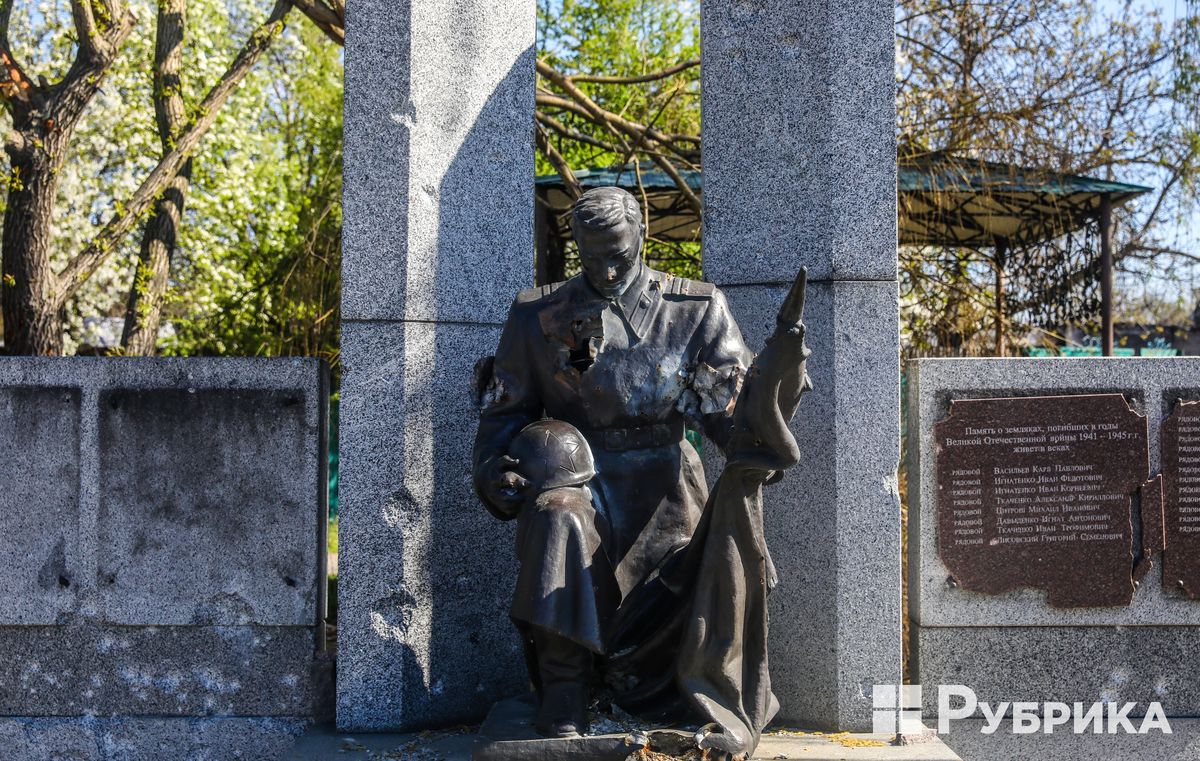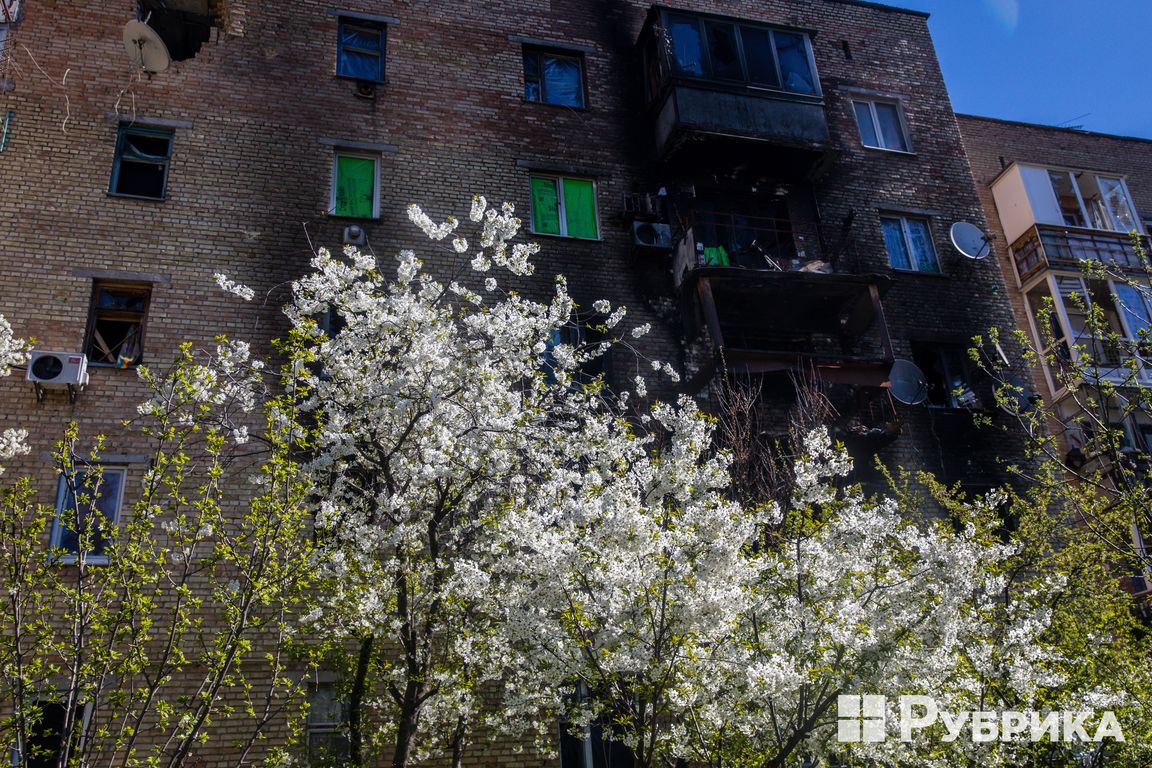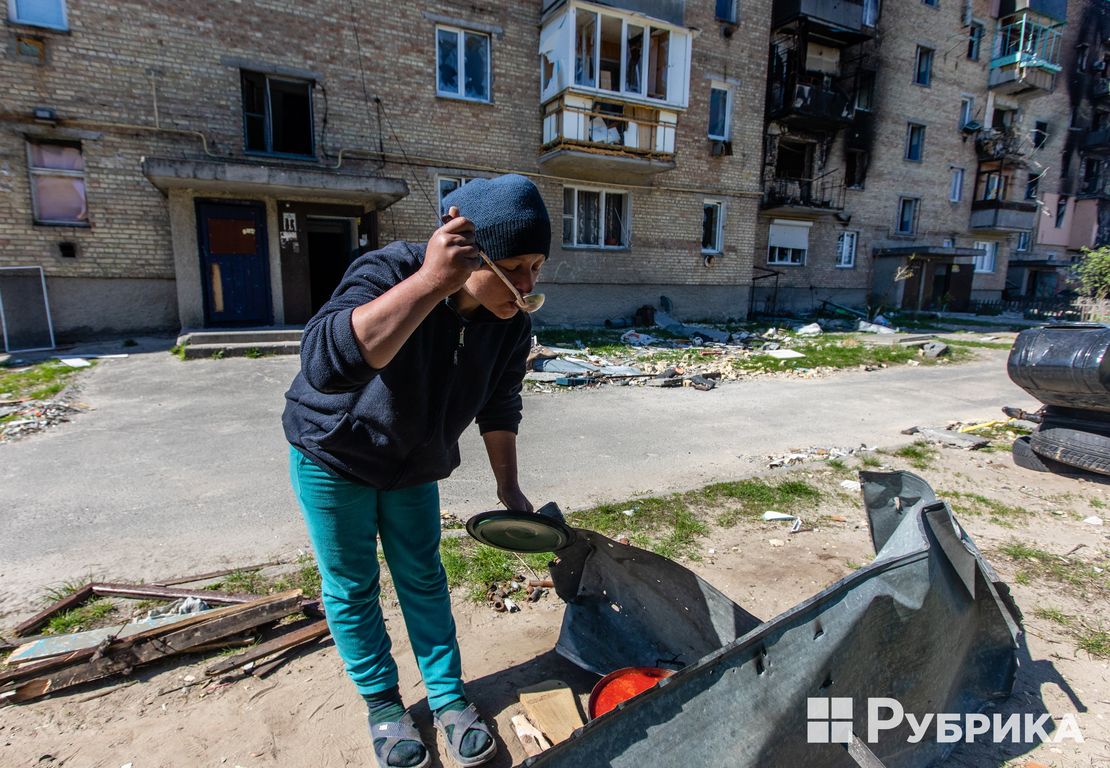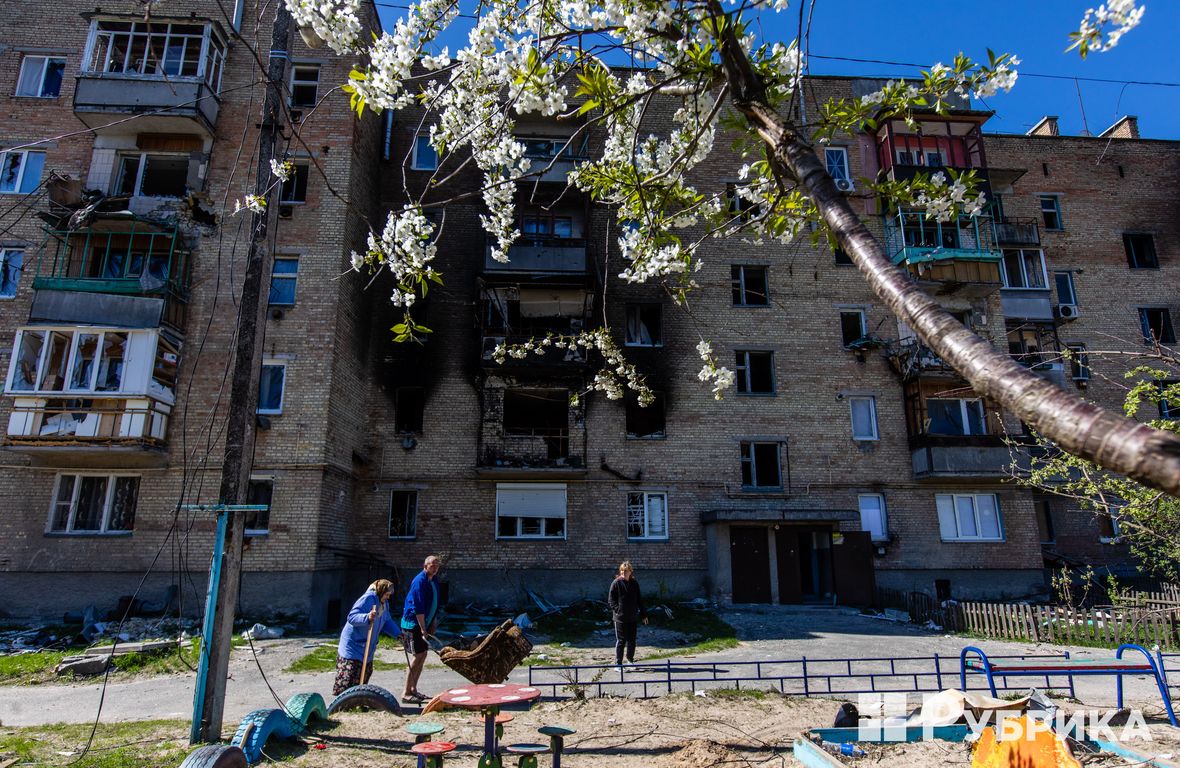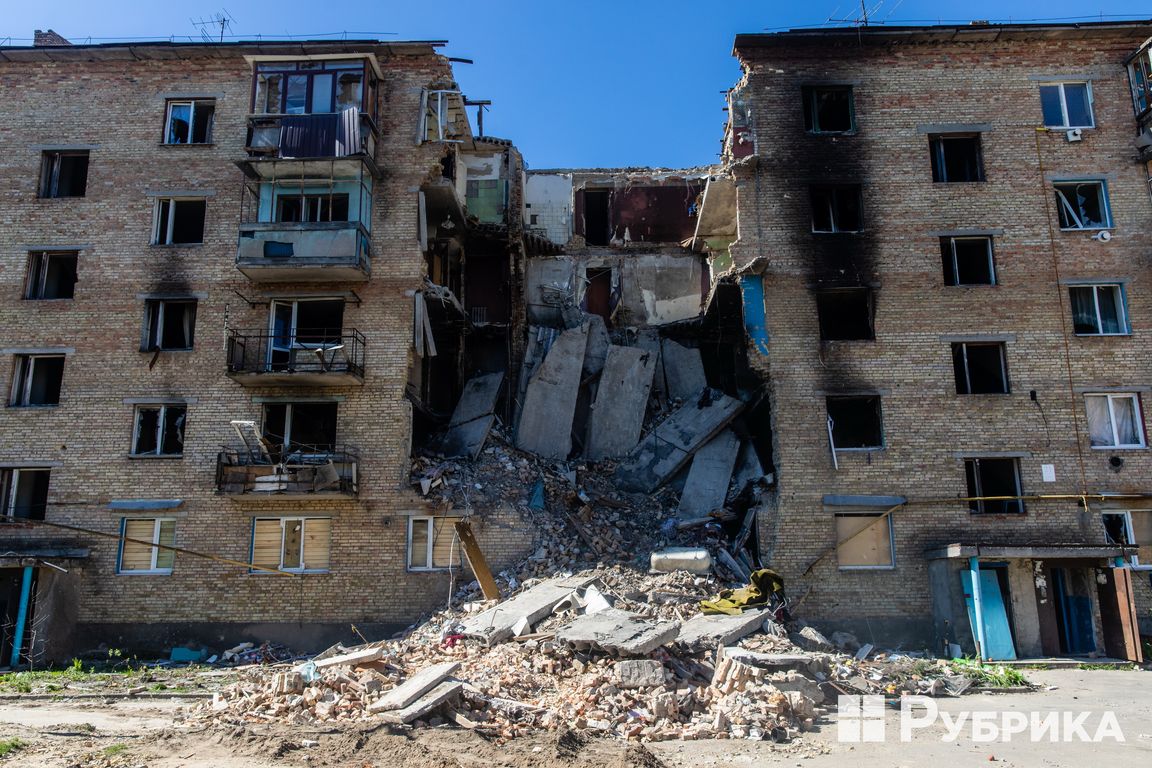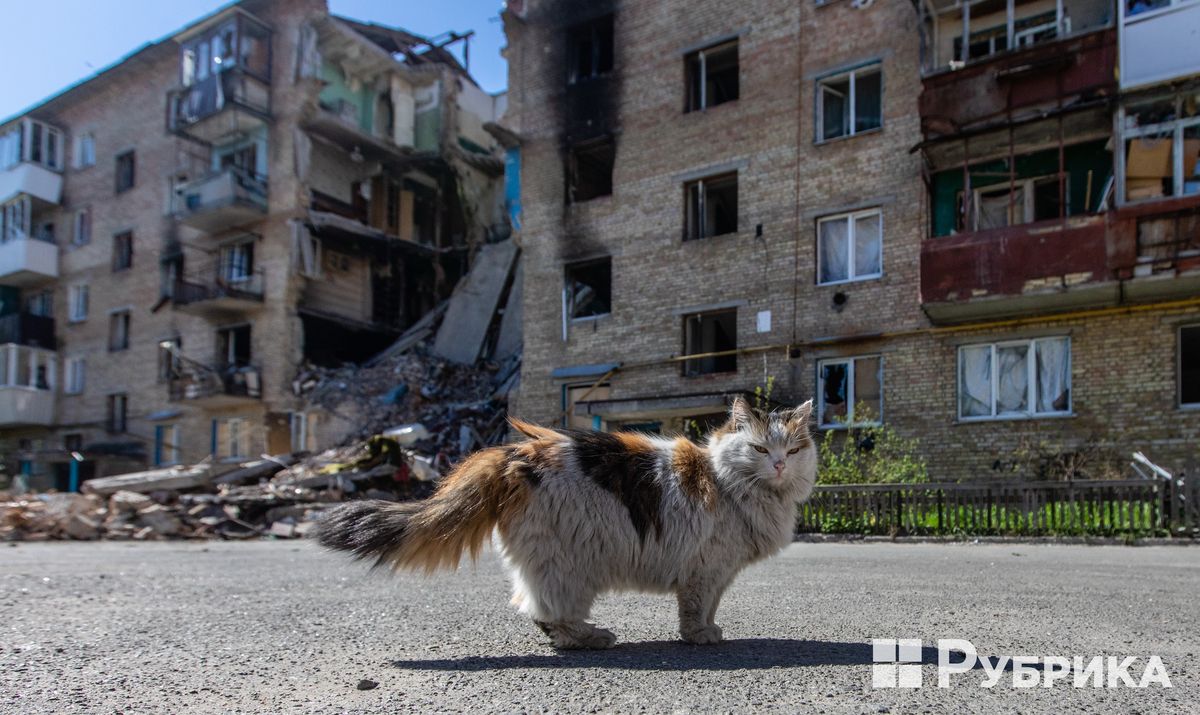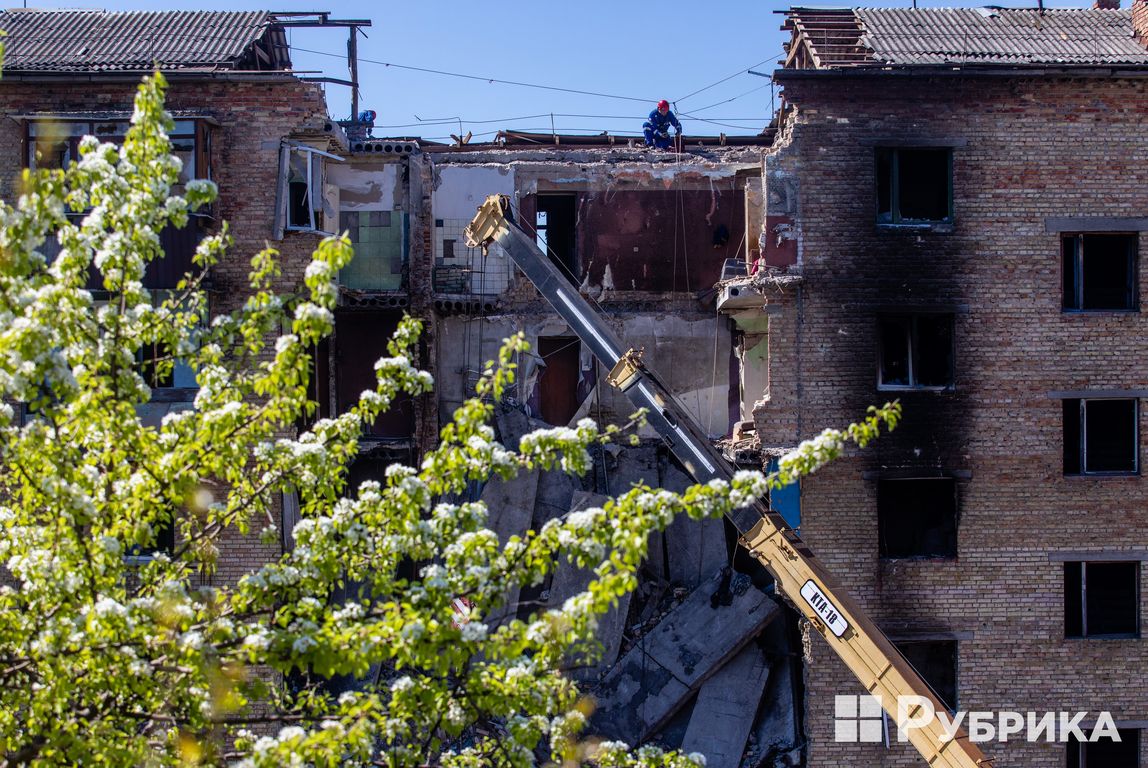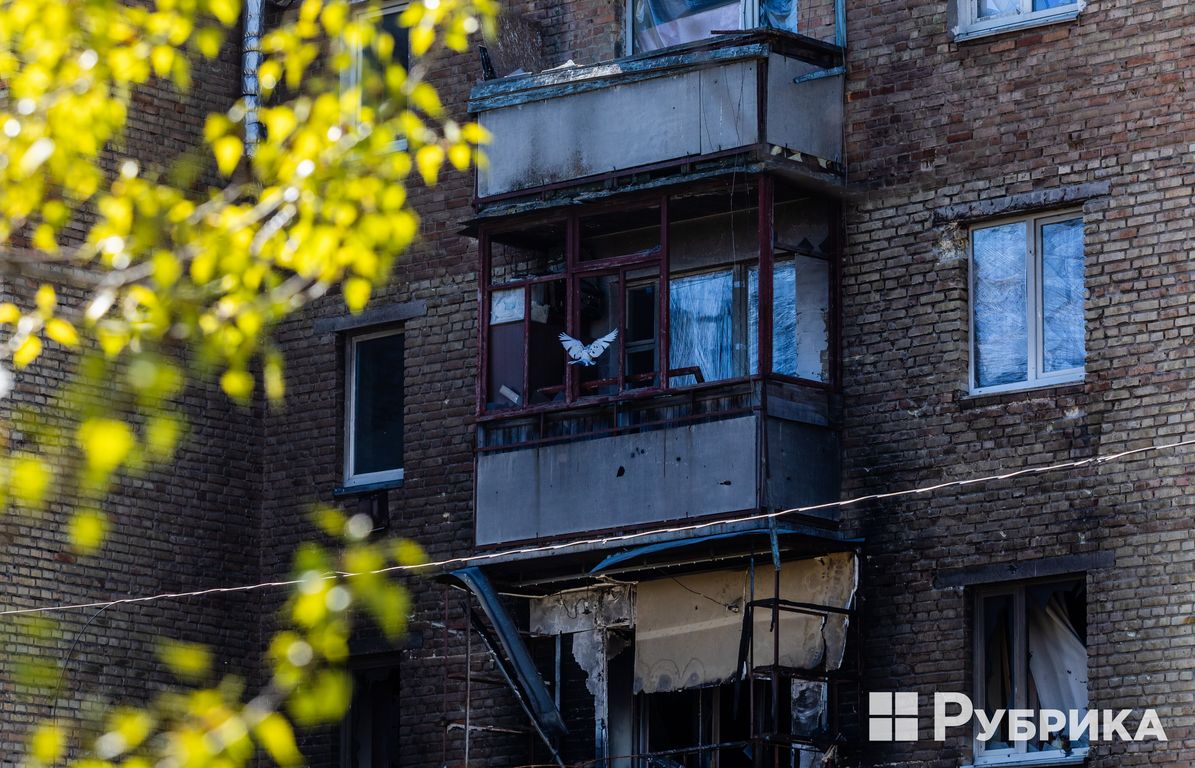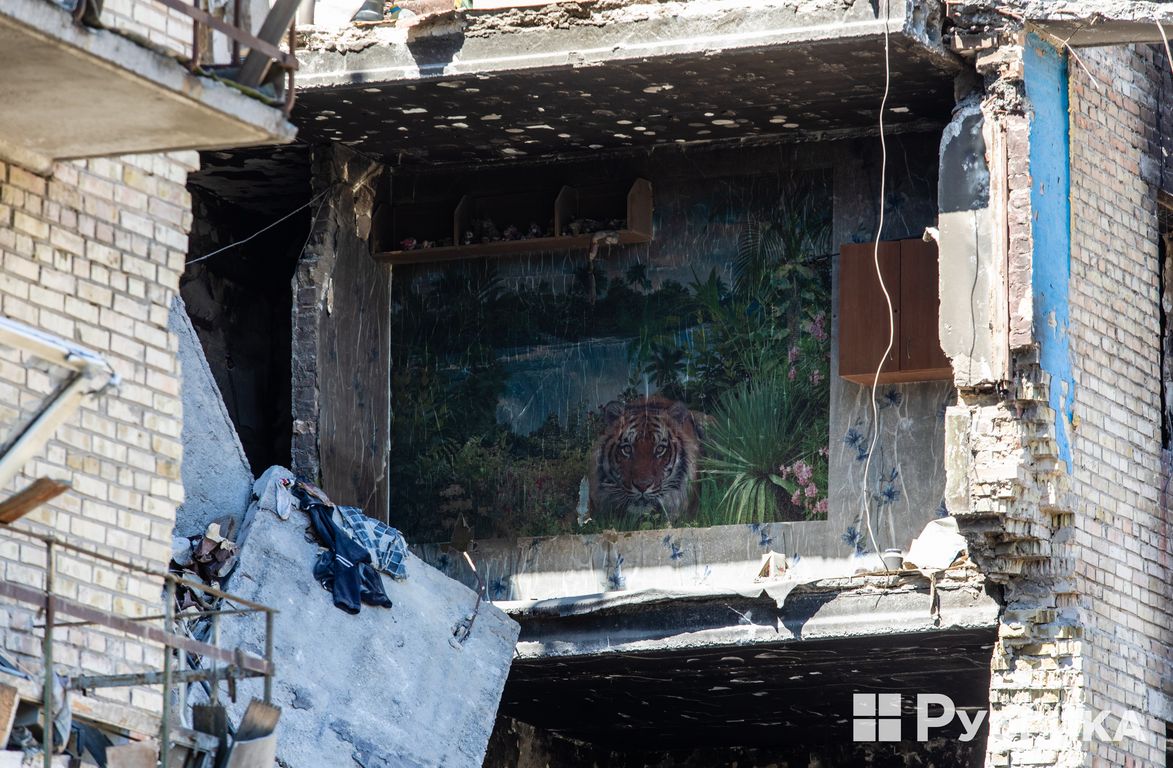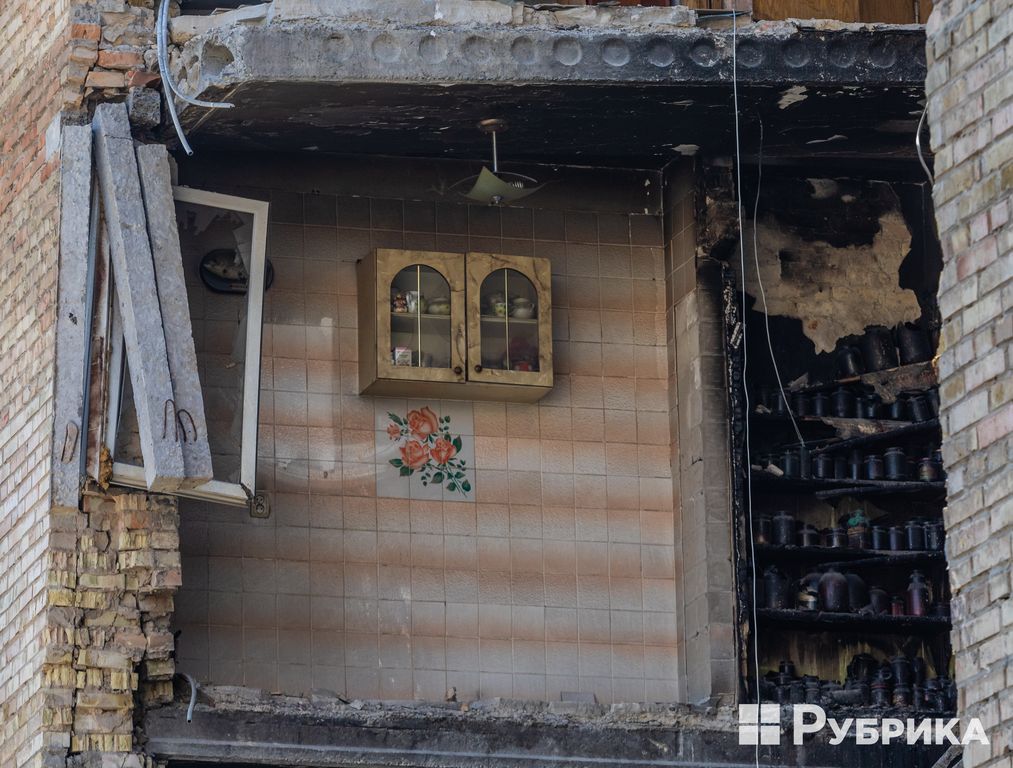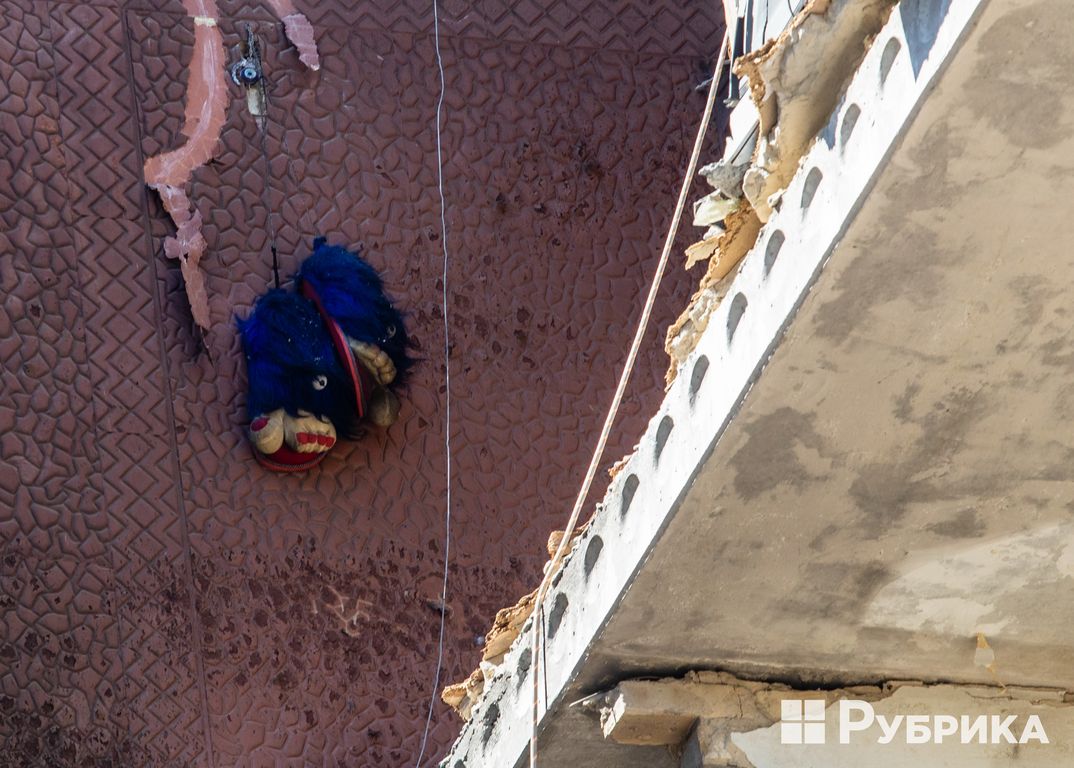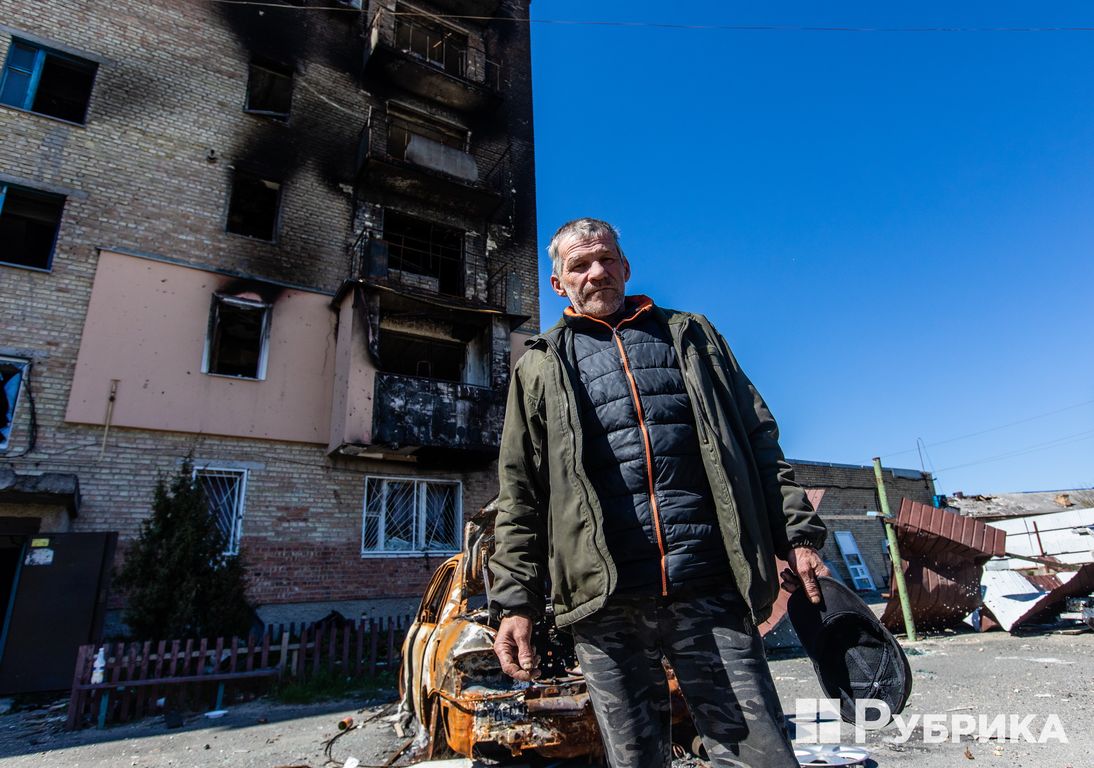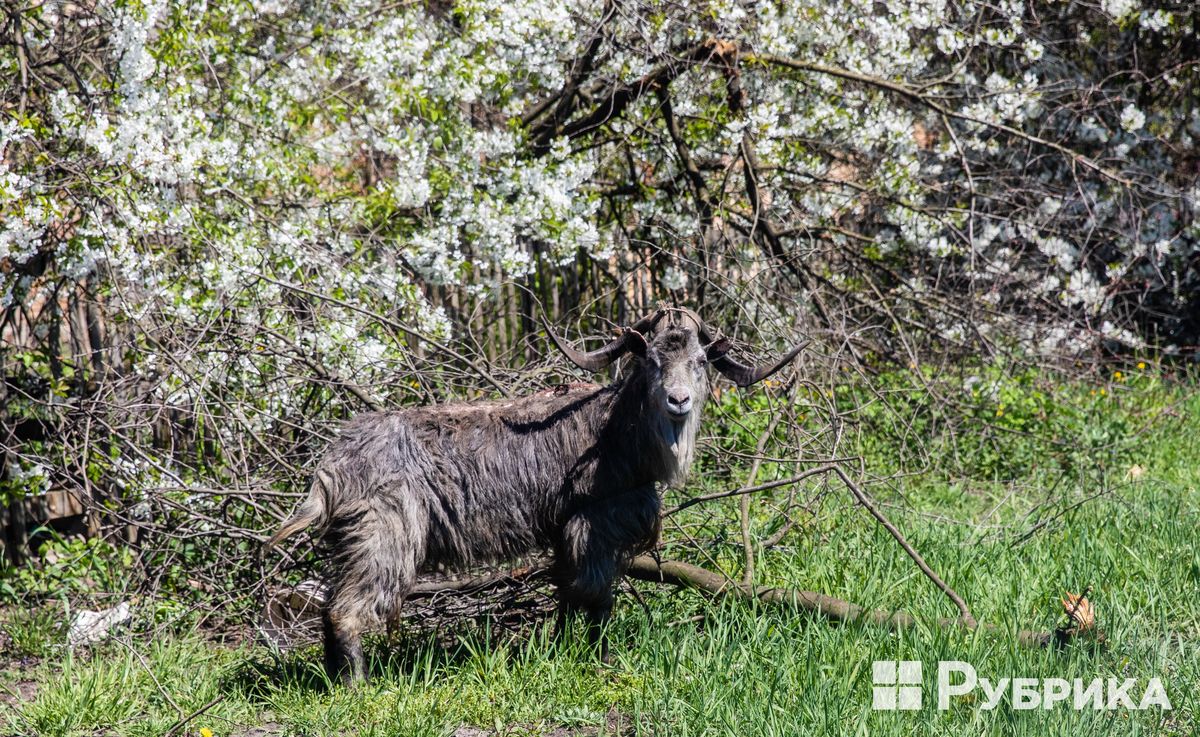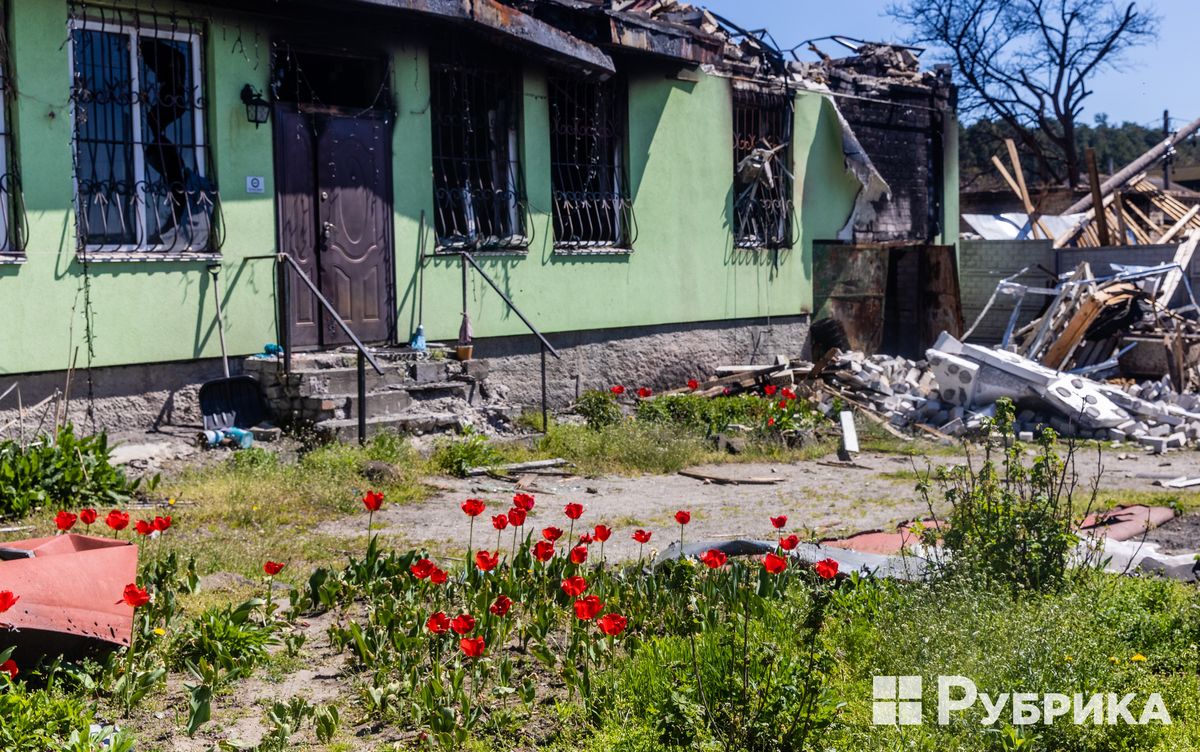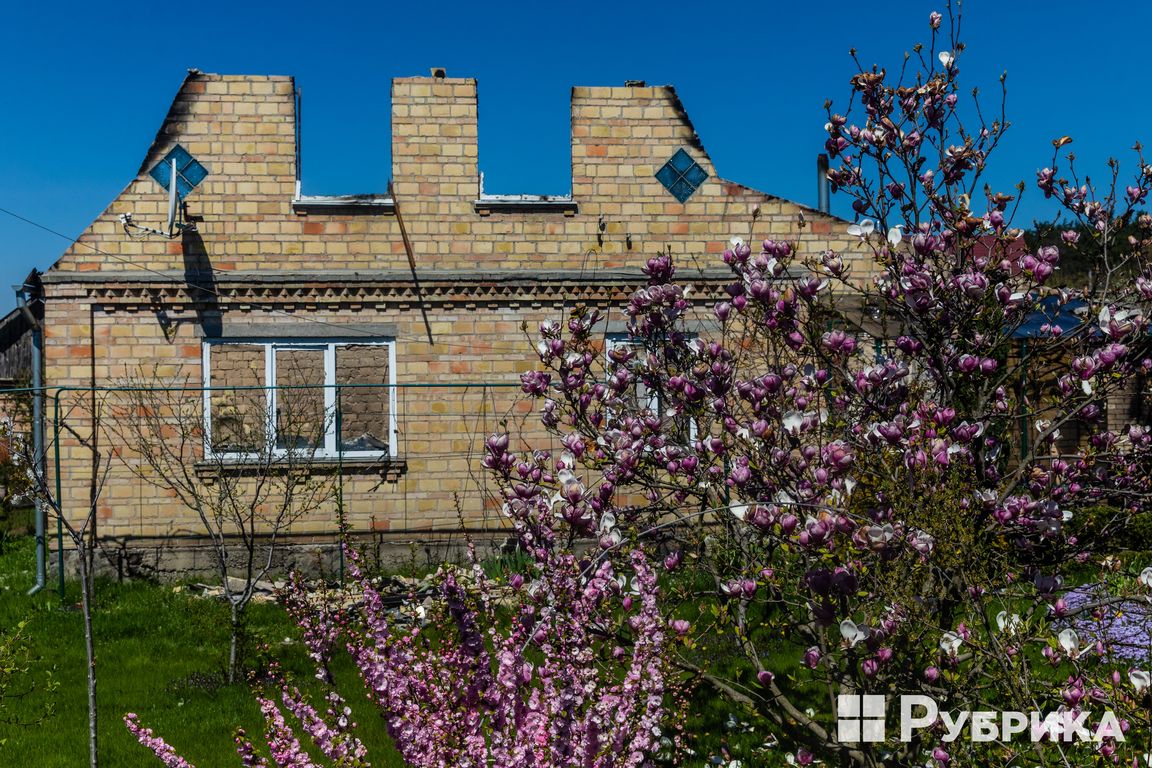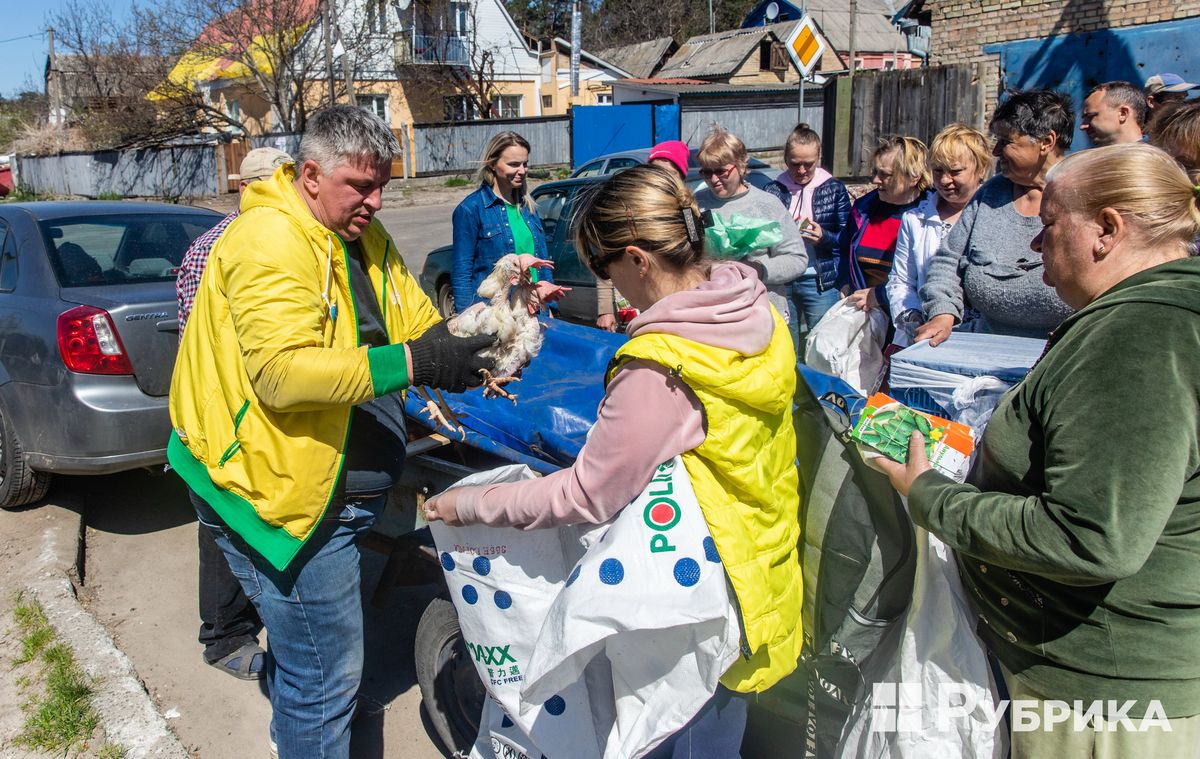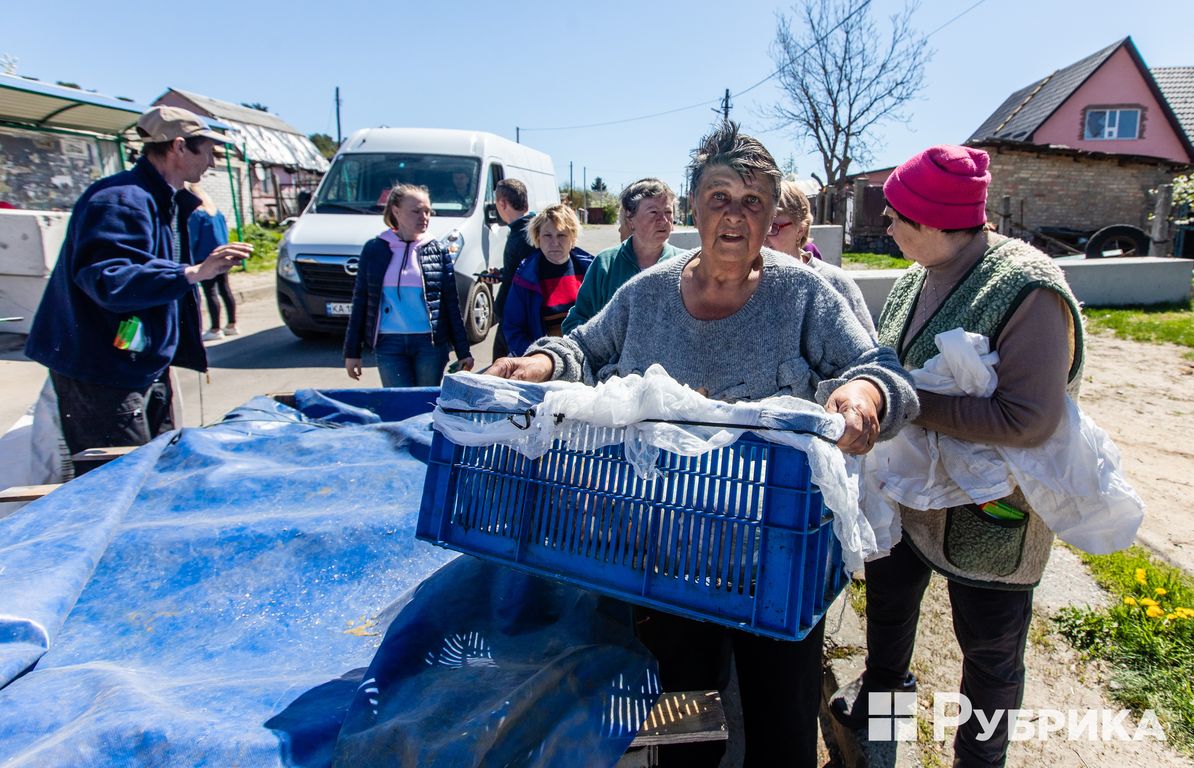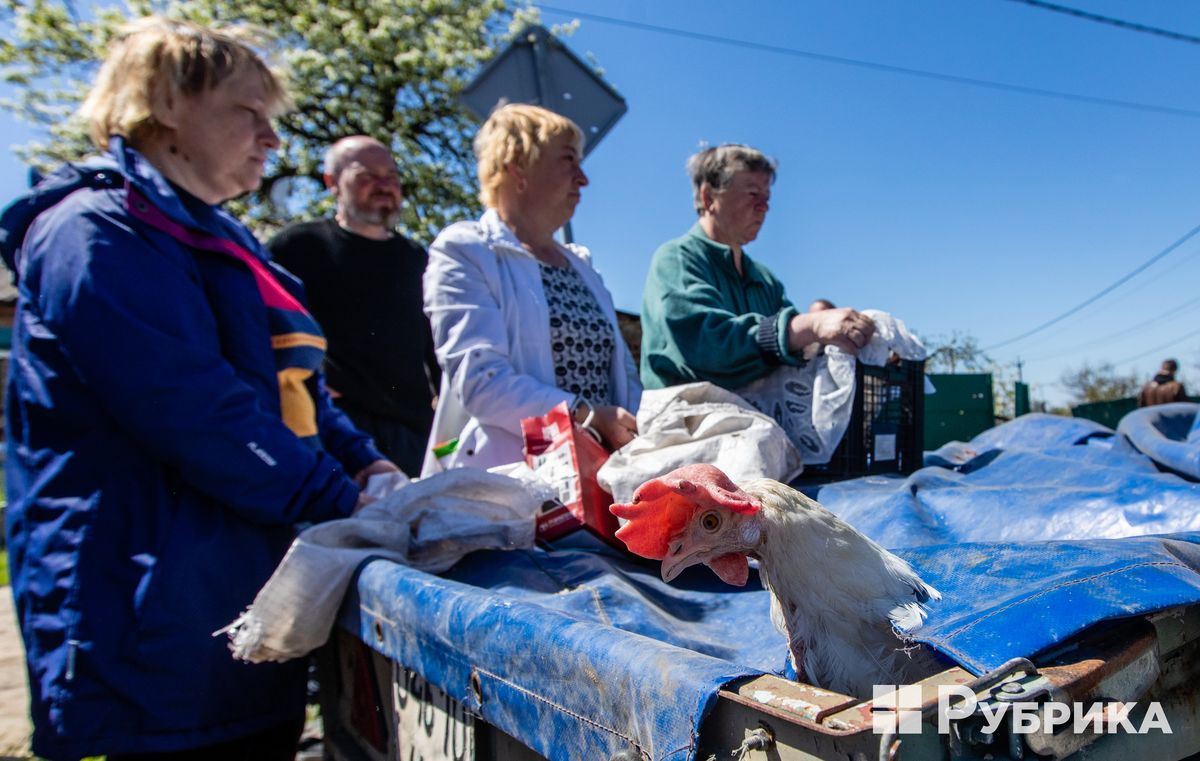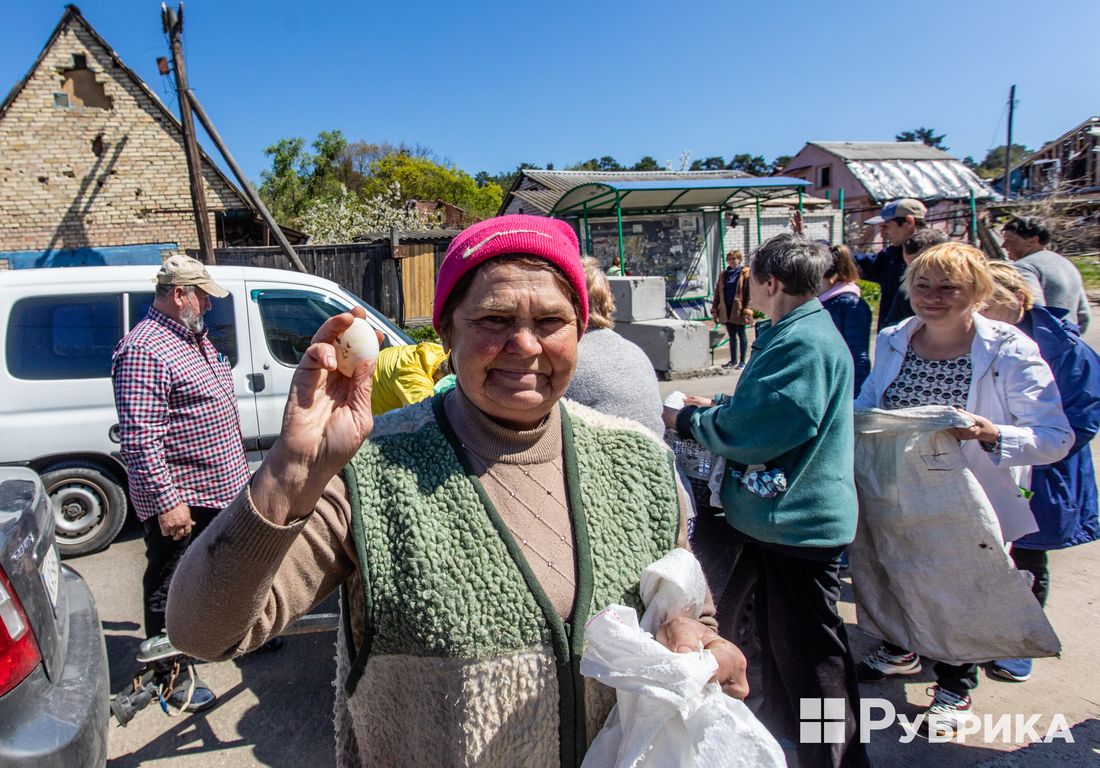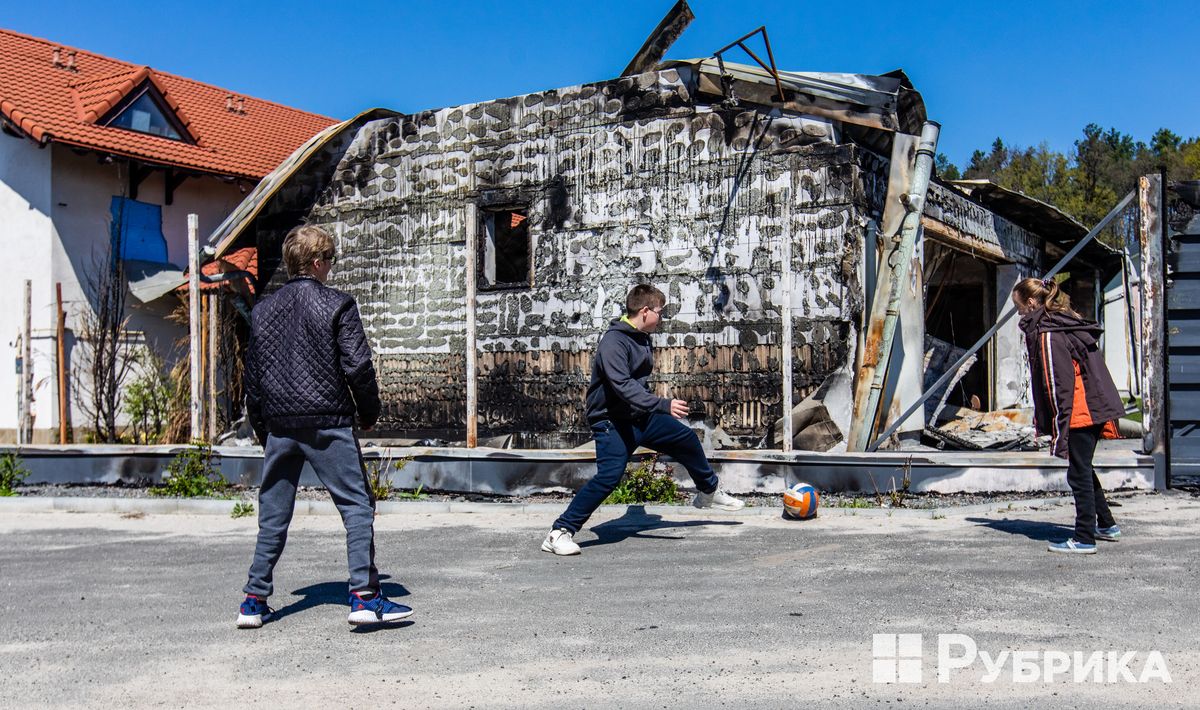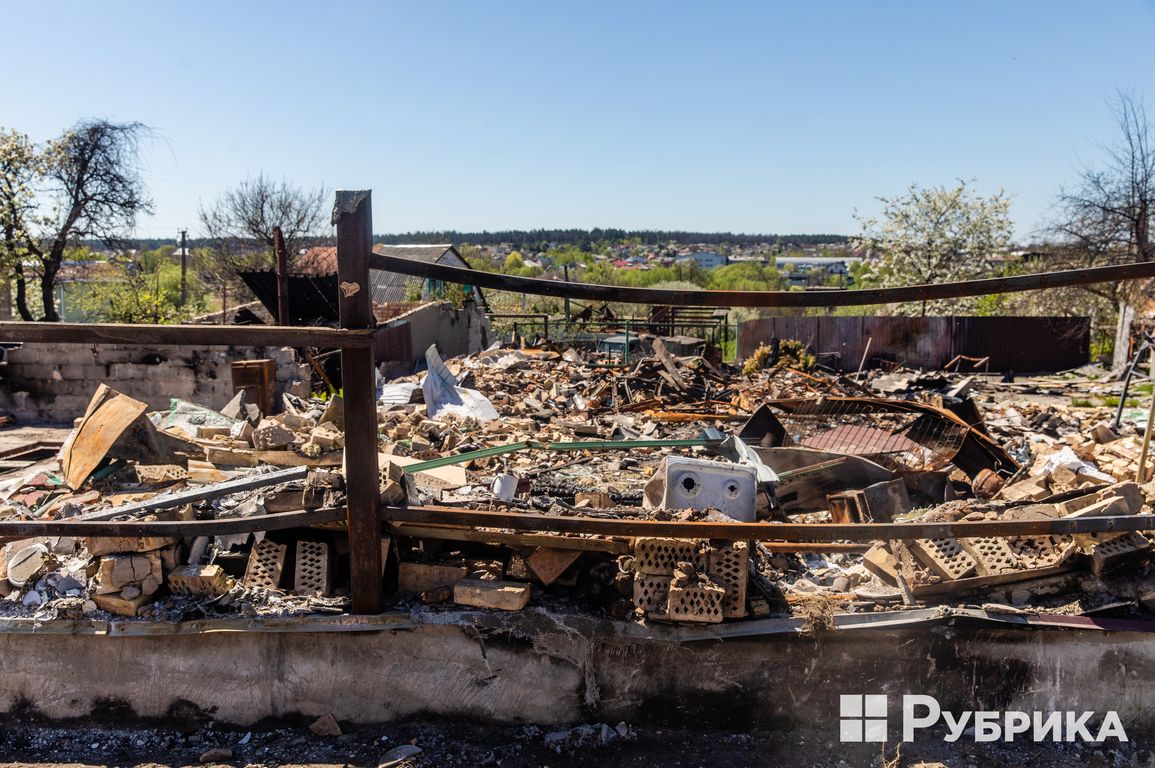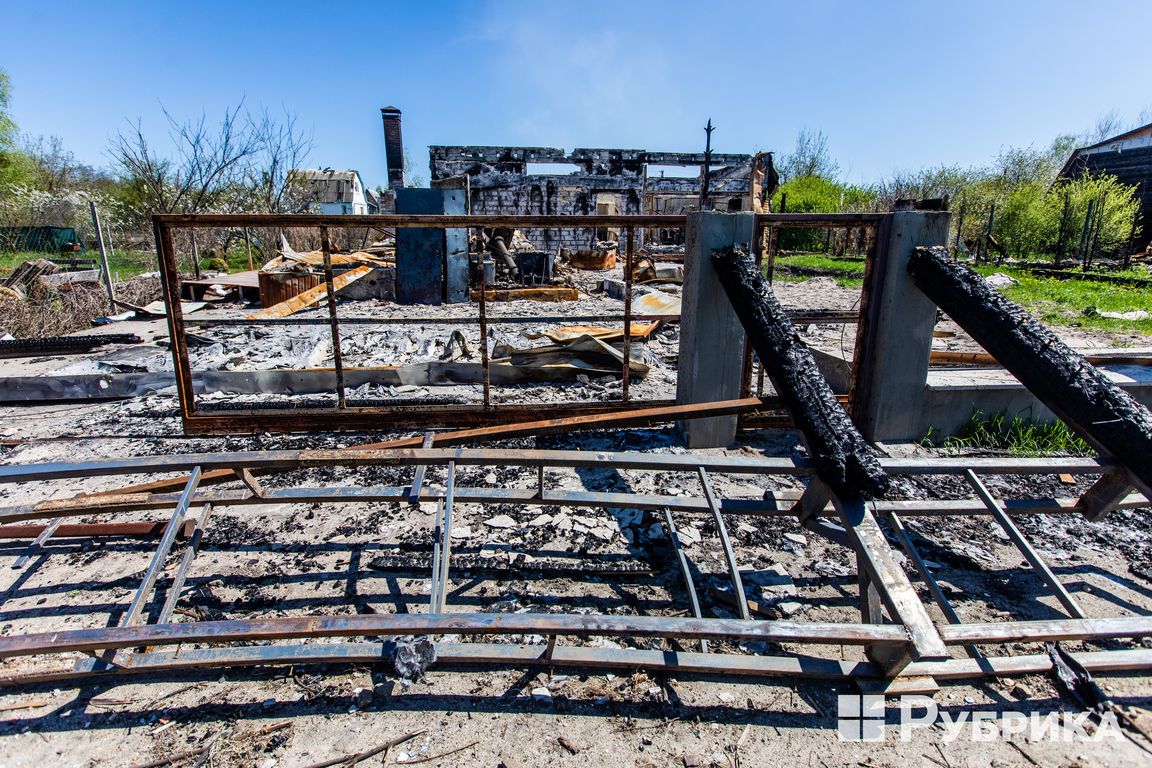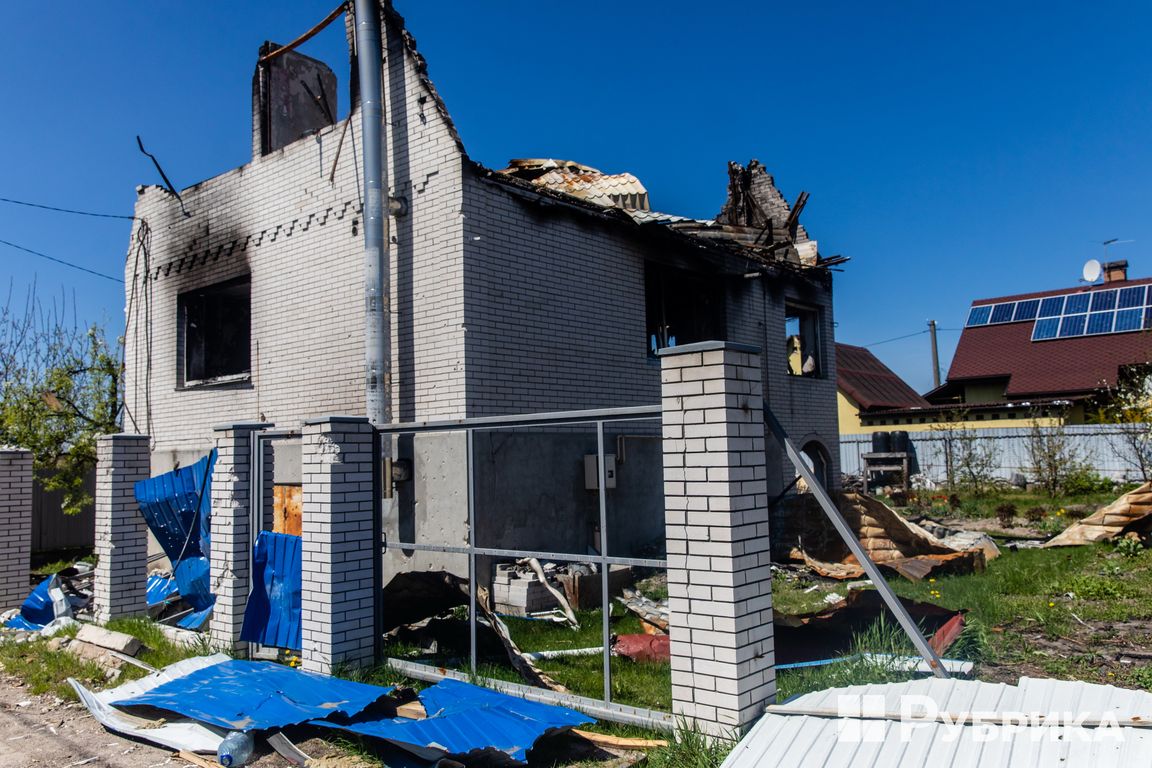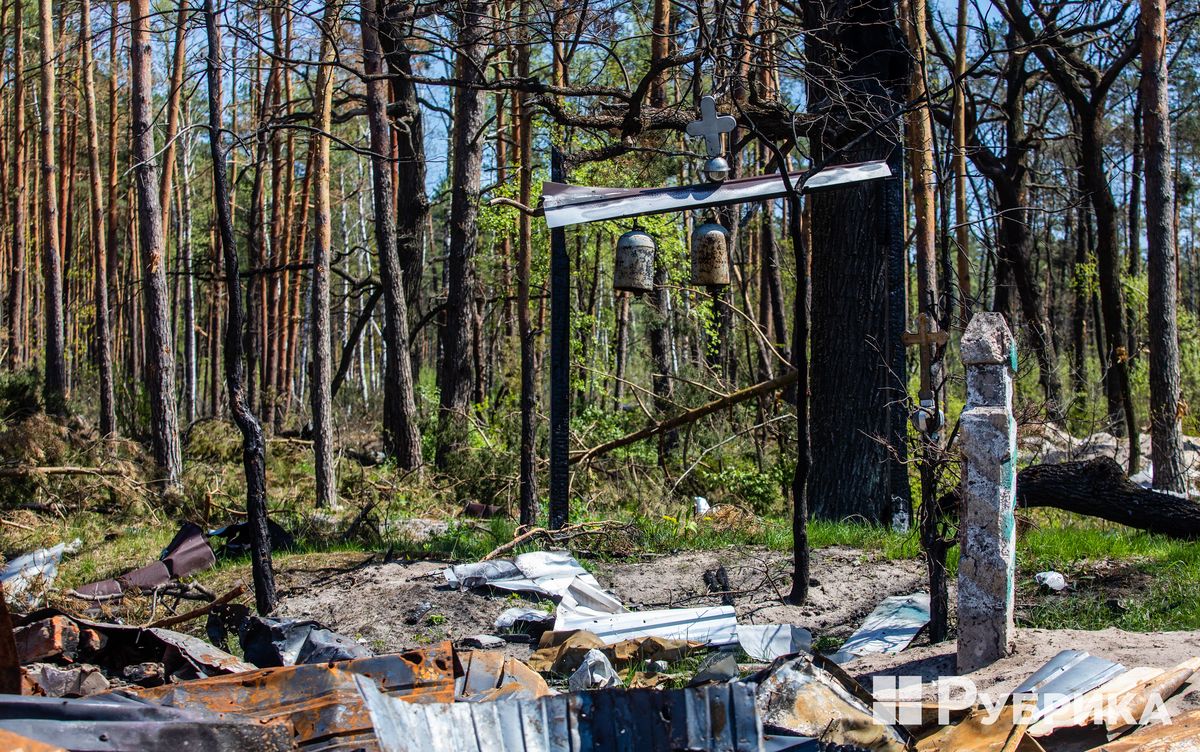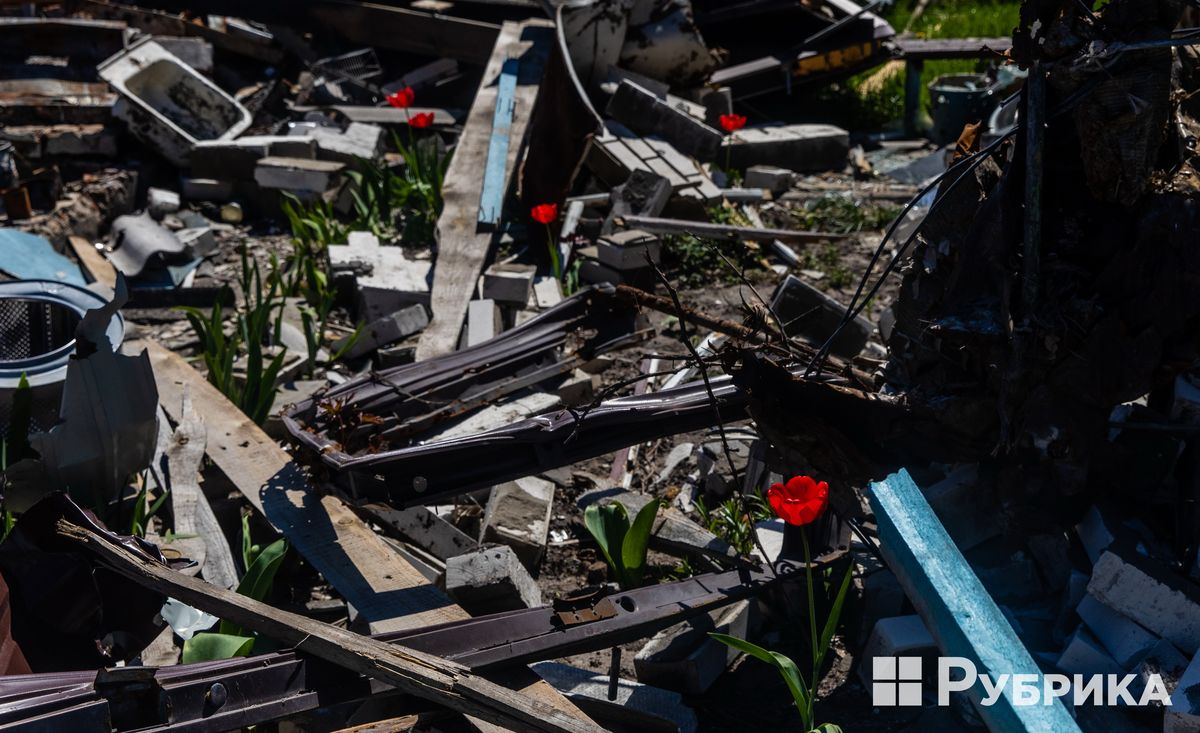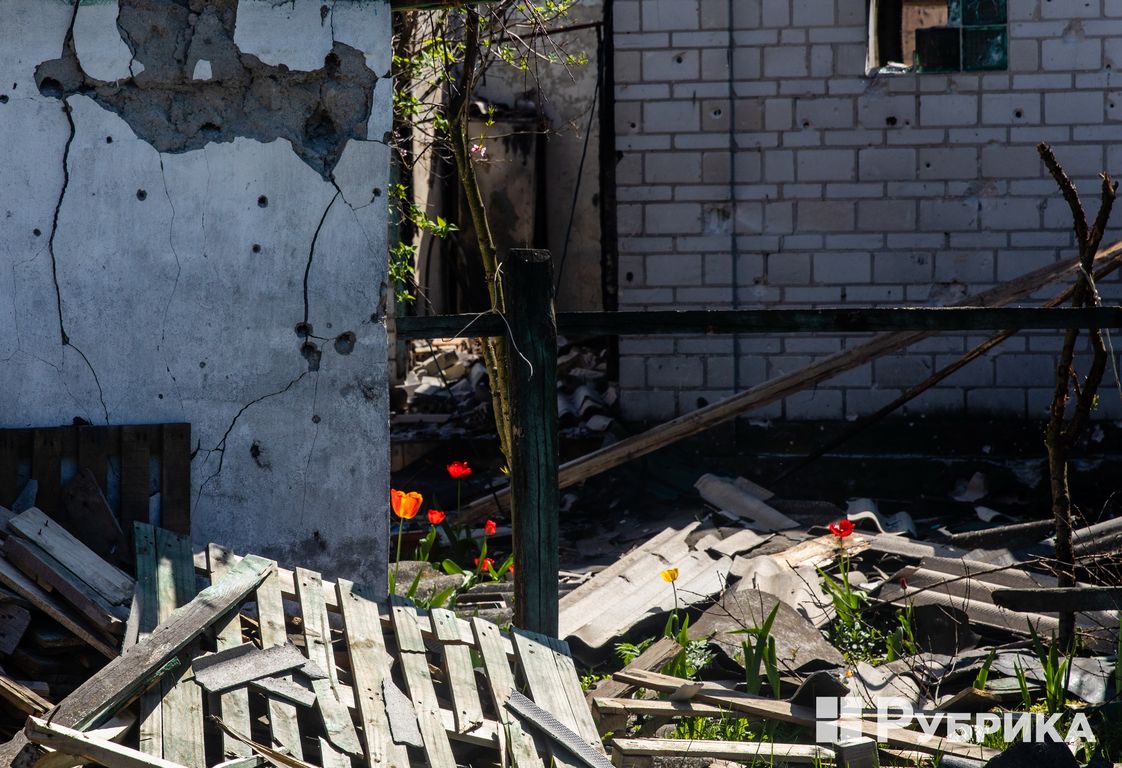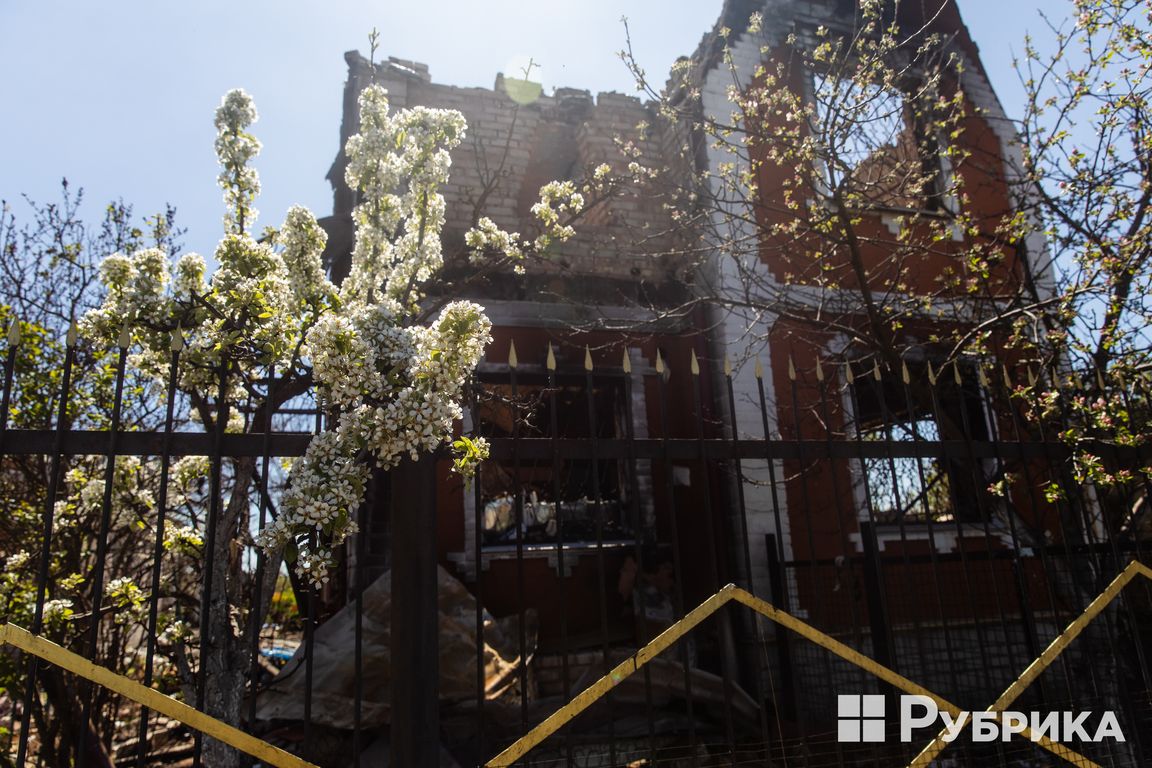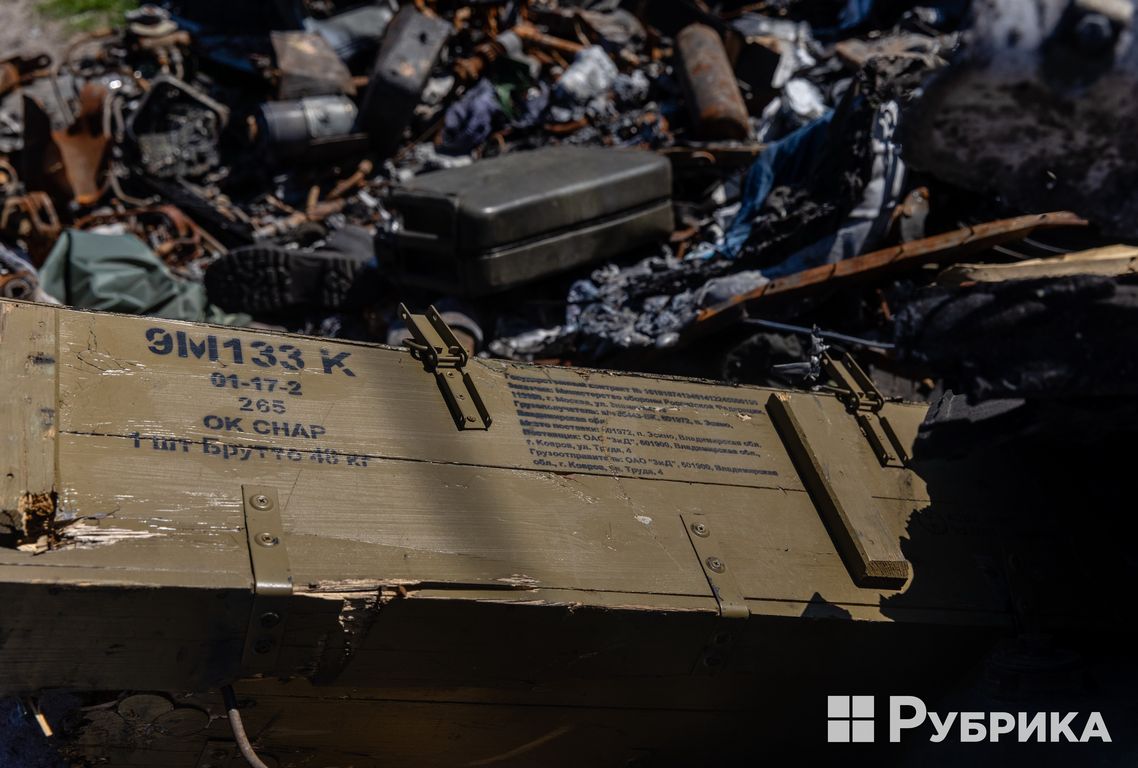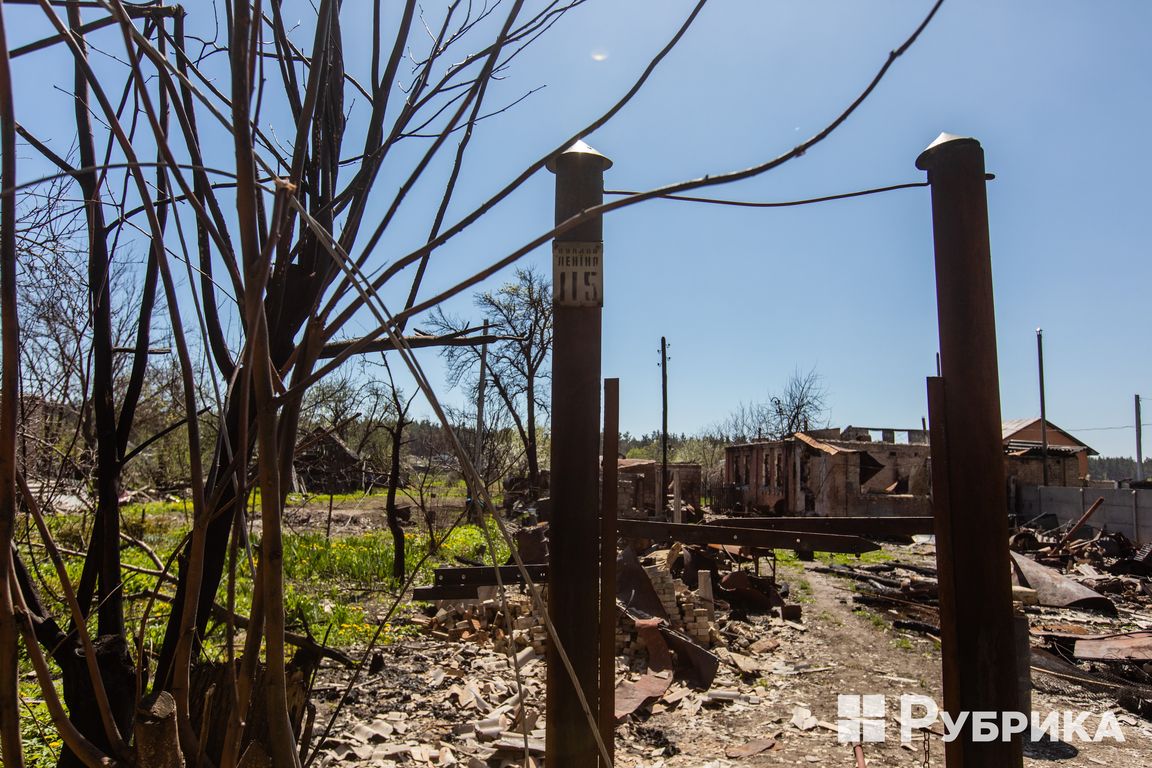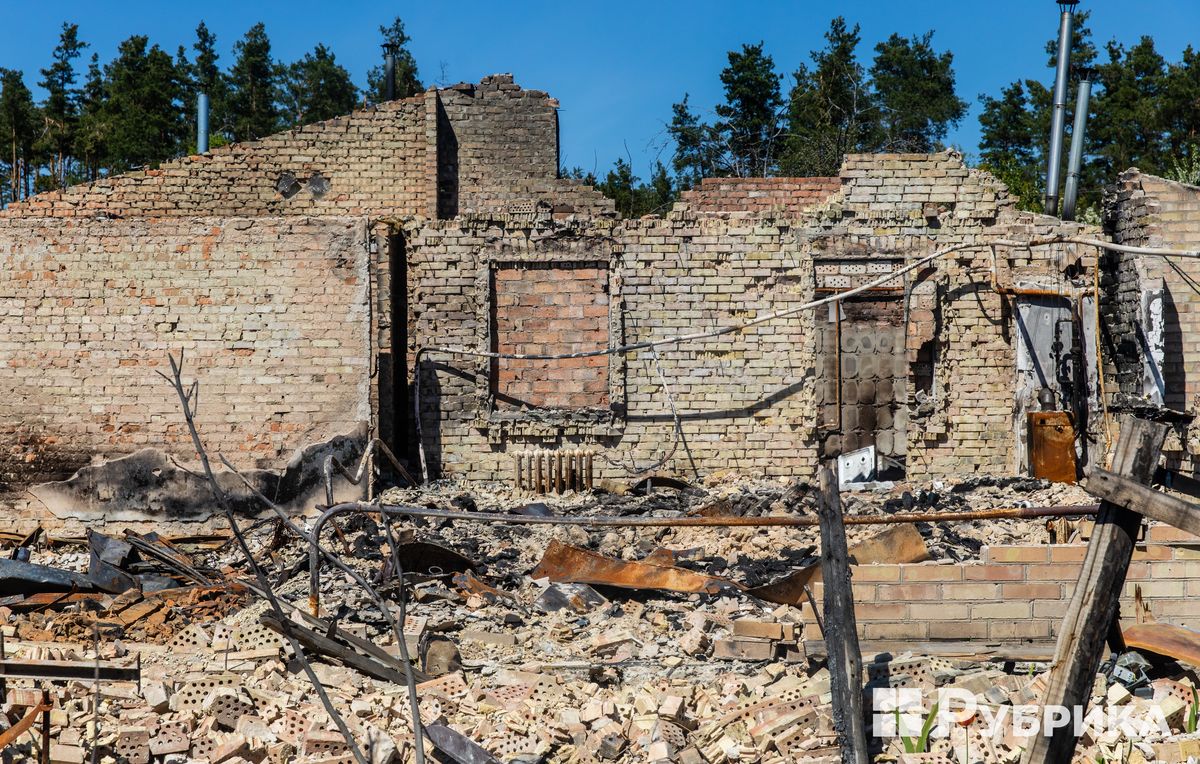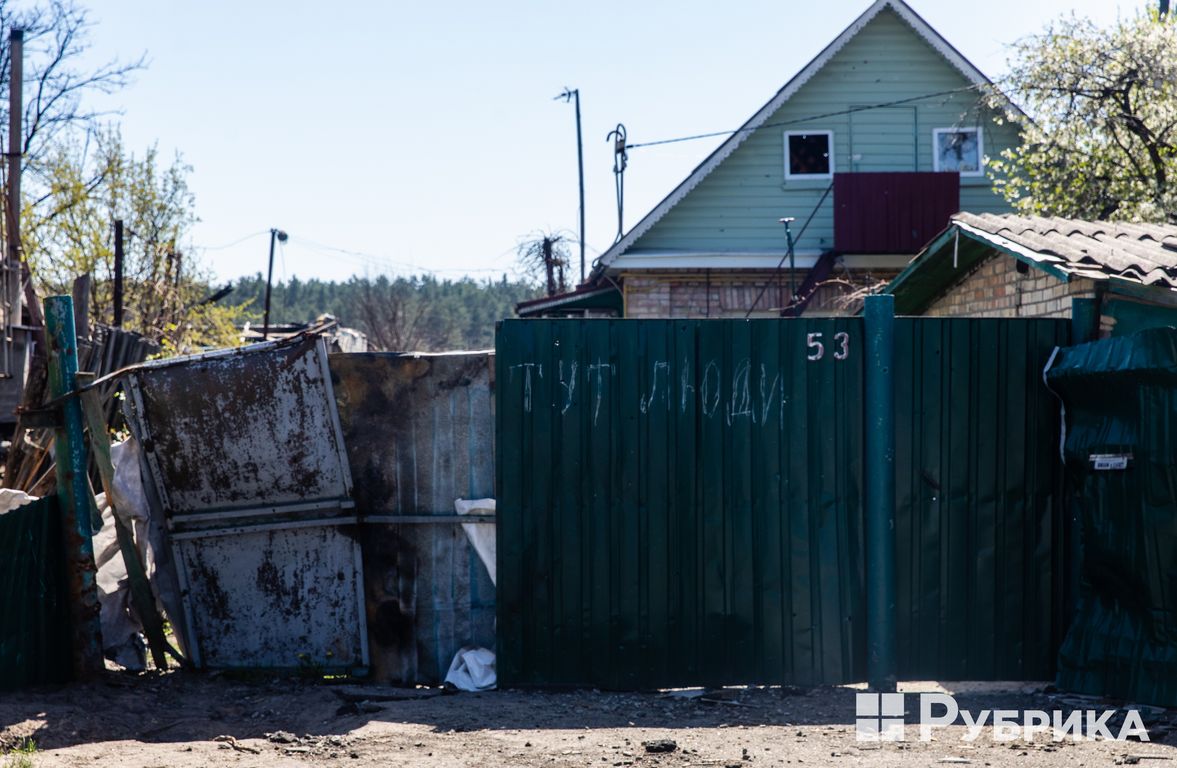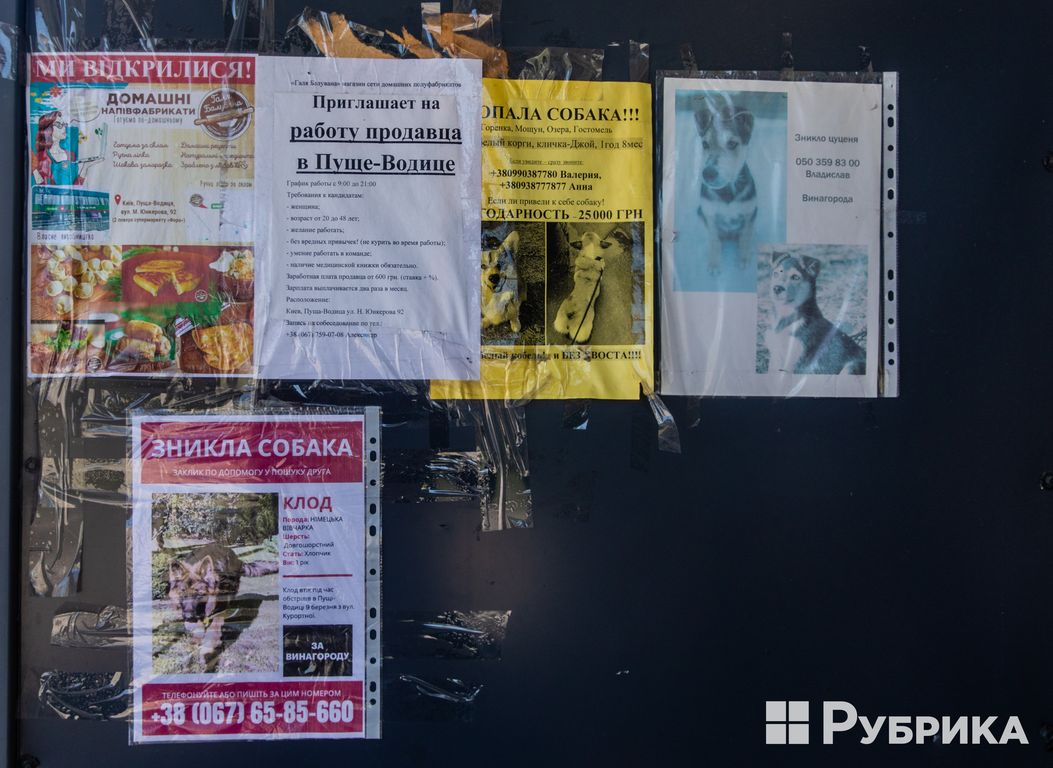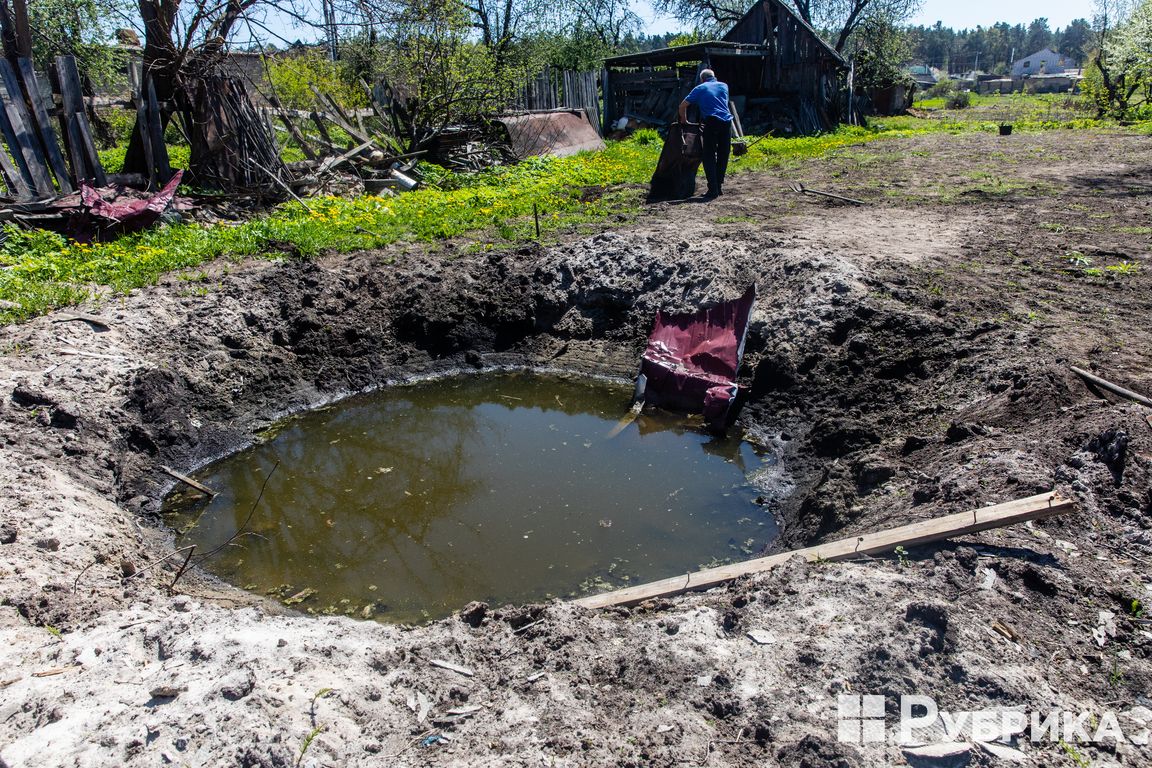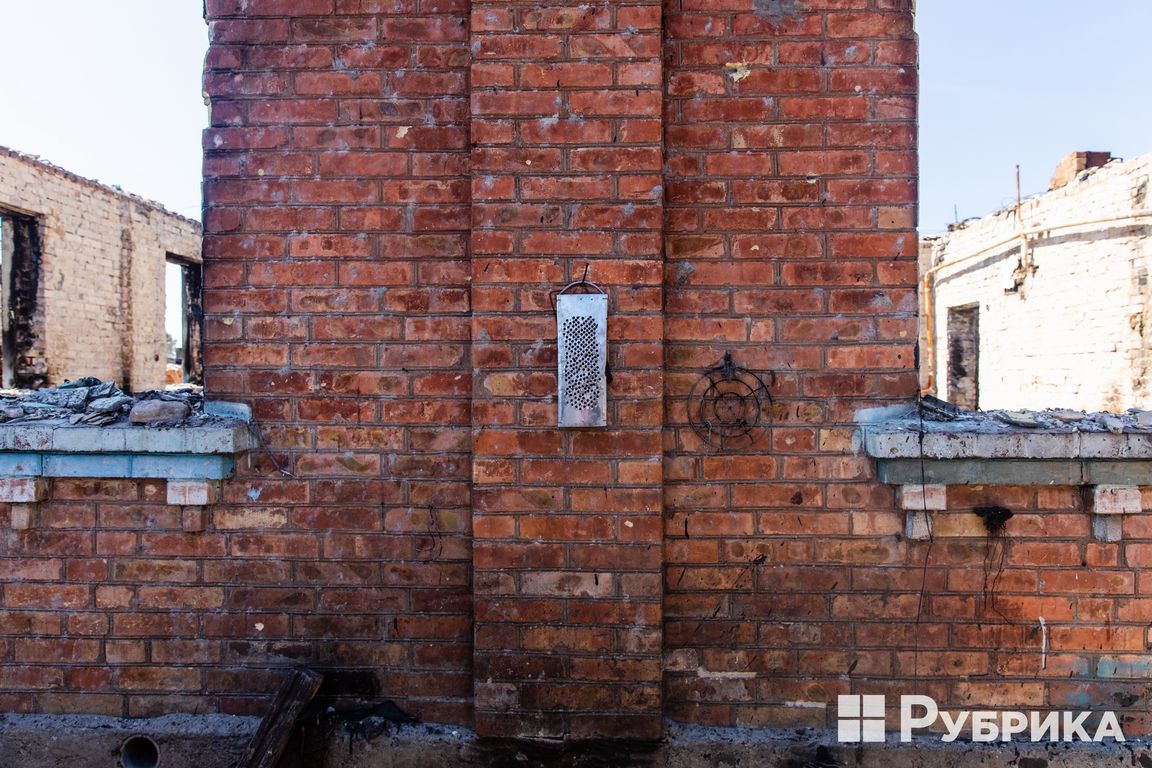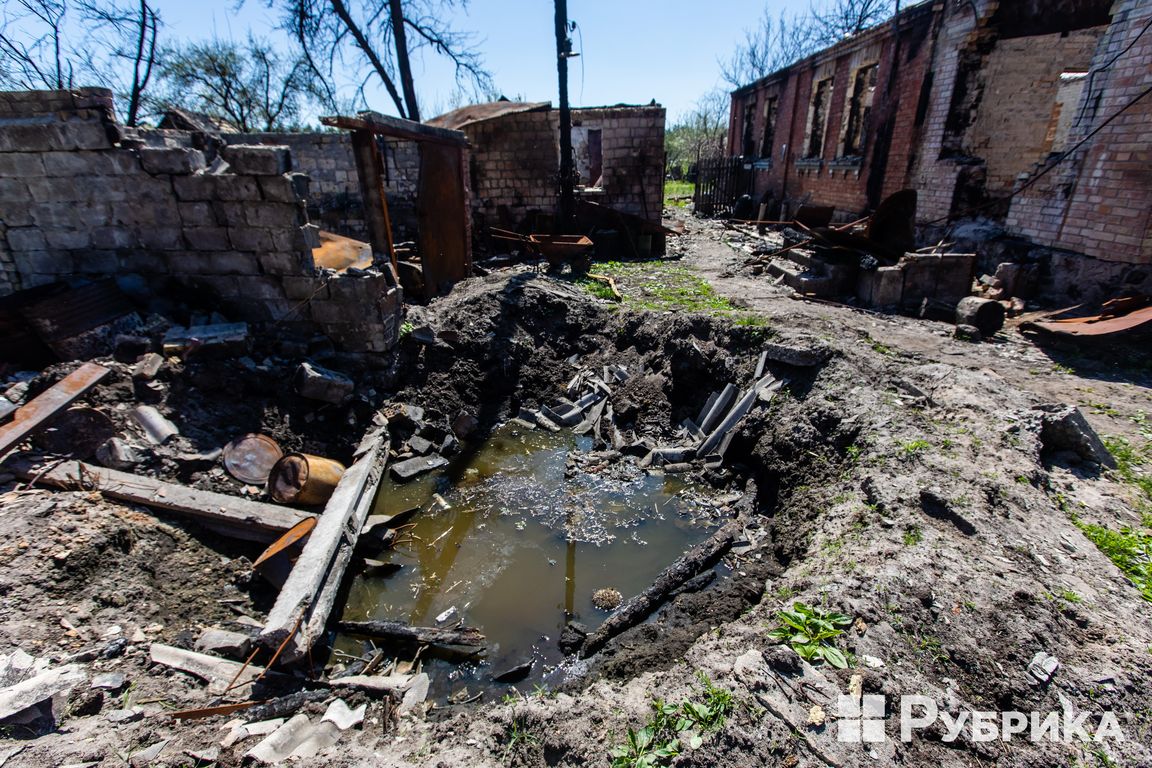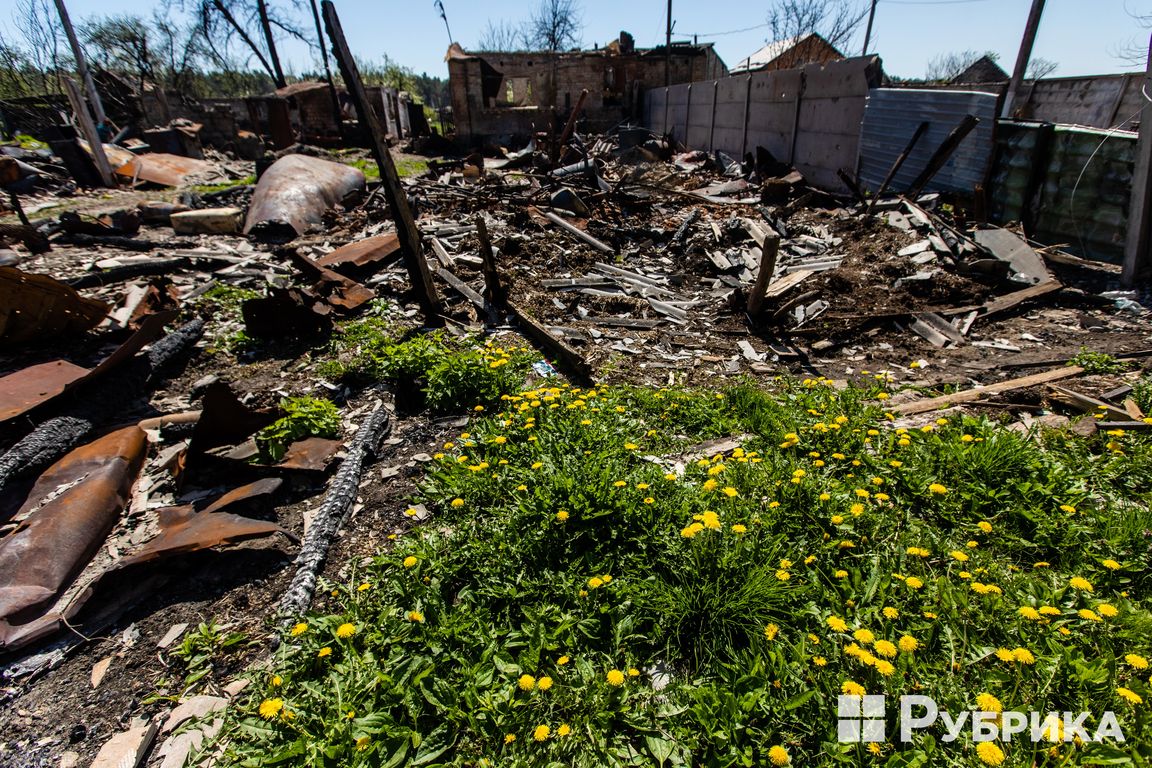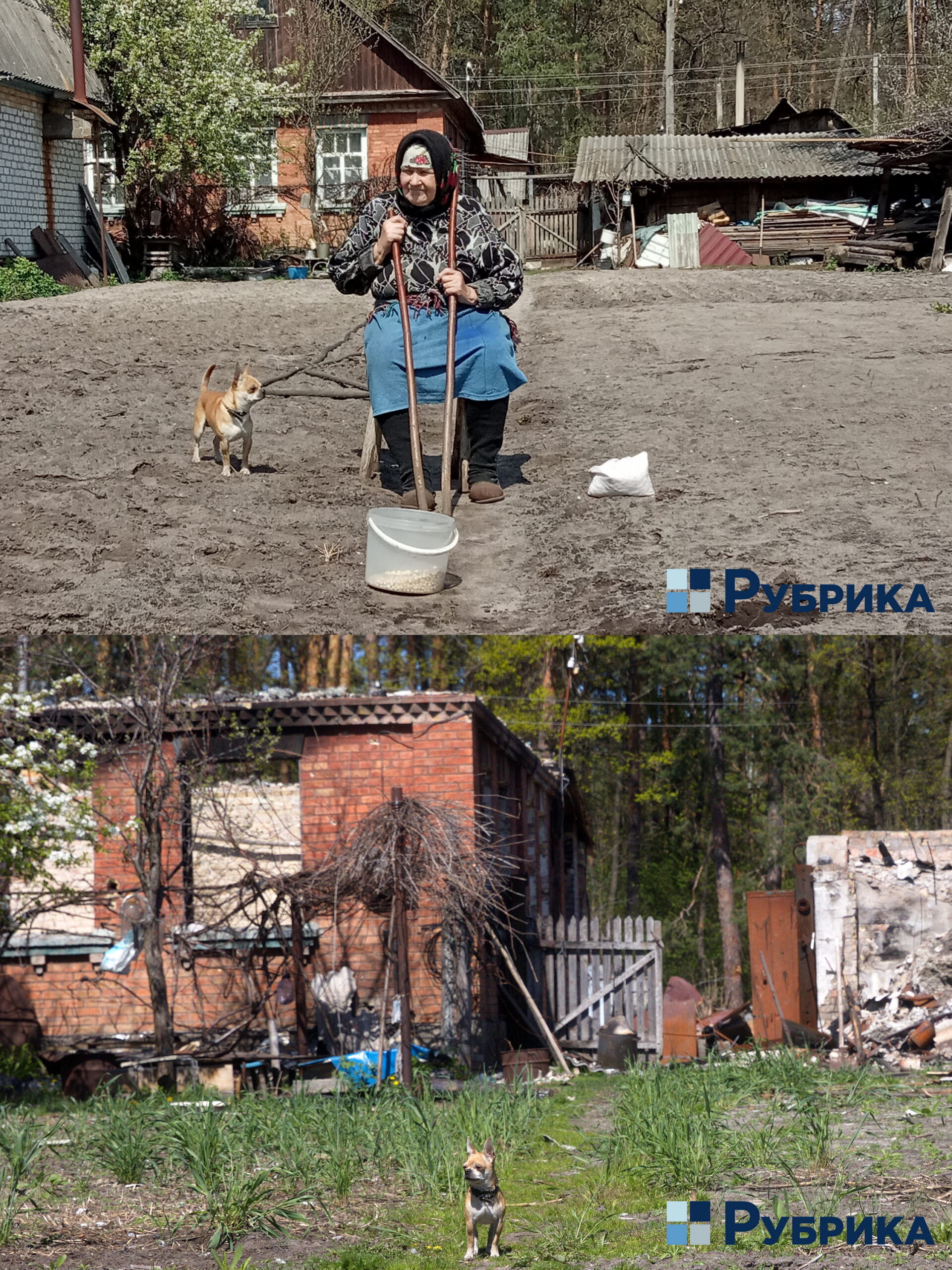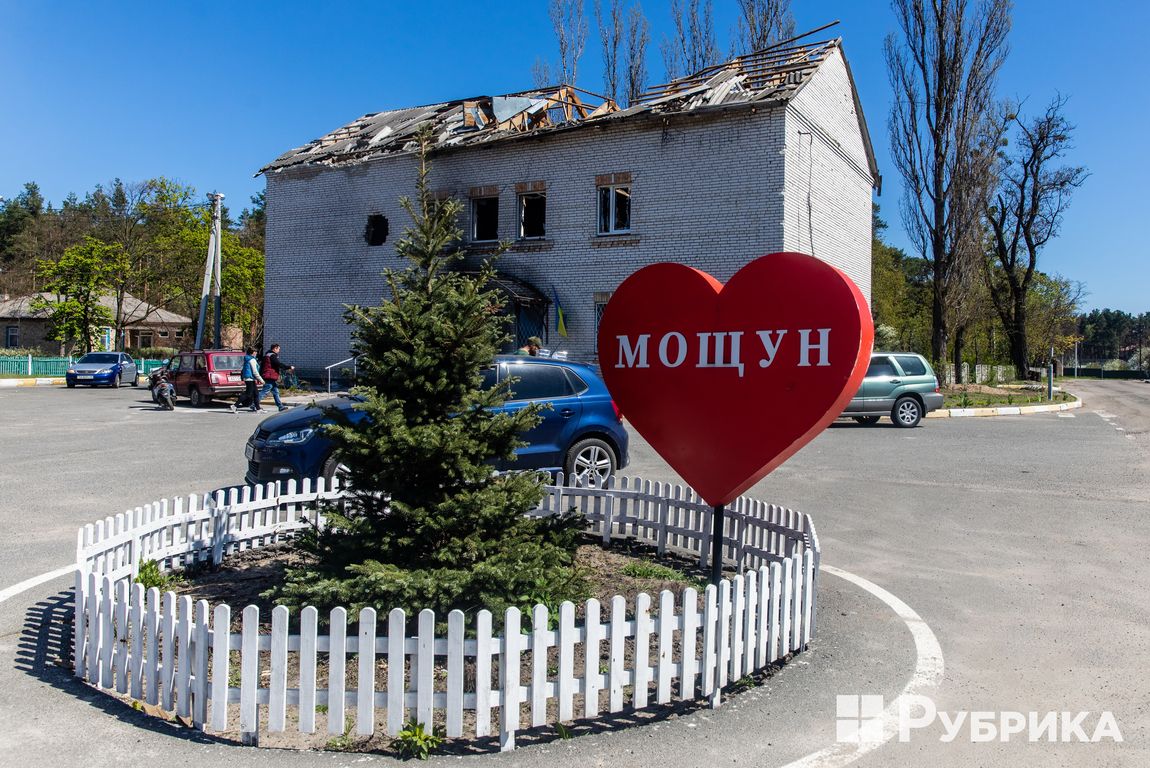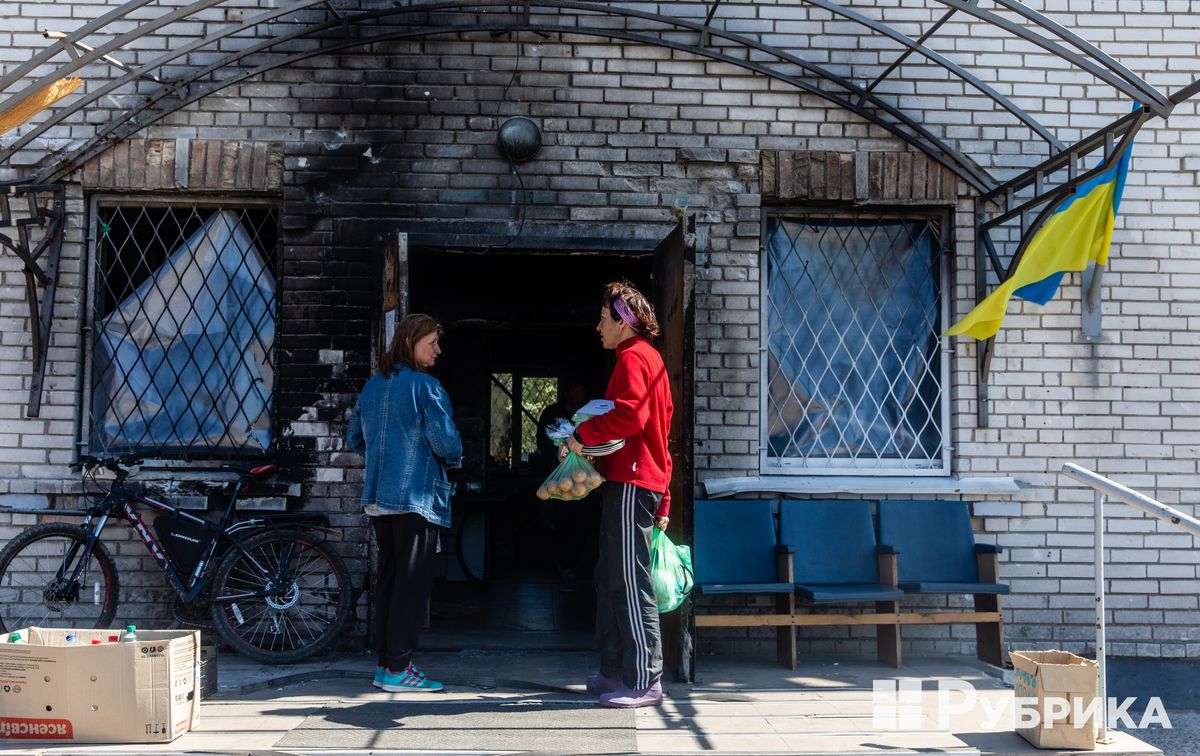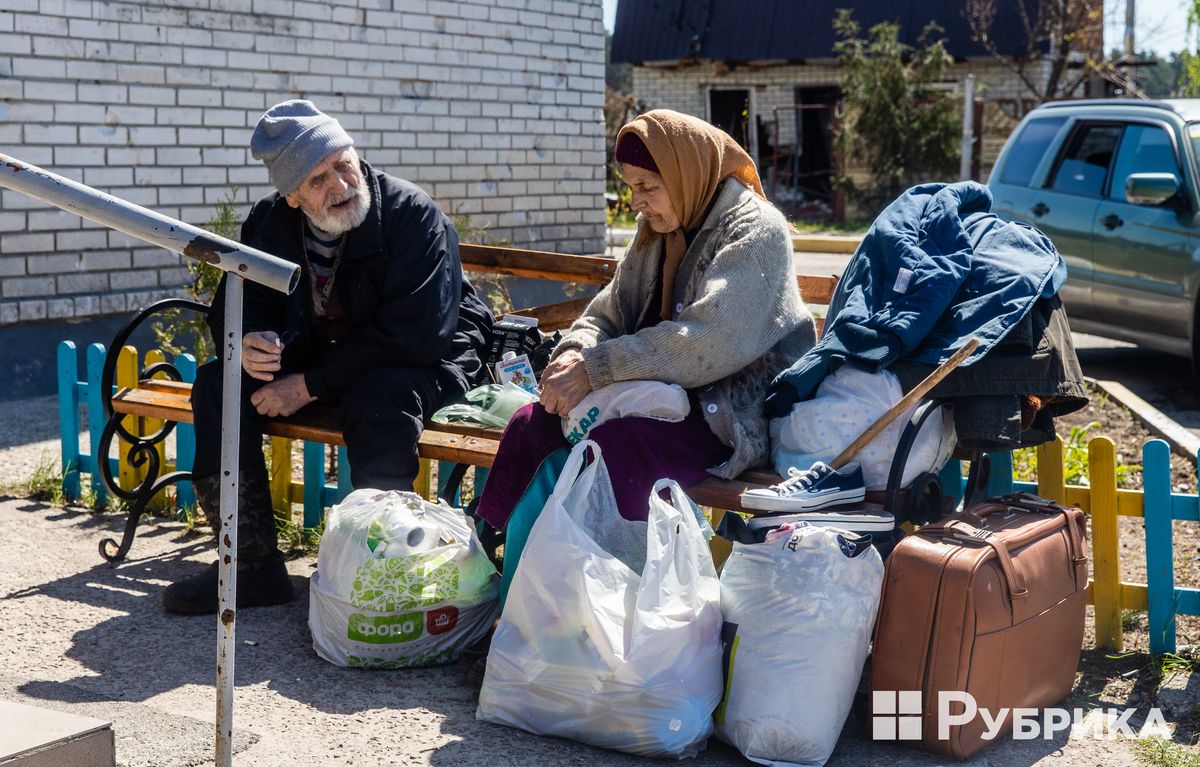
Horenka and Moshchun. Two villages very close to Kyiv, where there was a war until recently. Now life is gradually improving here, and people are returning to their houses. The public transport from Kyiv relaunched, so we get on a minibus that goes to Bucha and get off earlier, on the turn to Horenka.
There is a shot Soviet military monument on the grave of forty soldiers who died in 1943 with the inscription "No one is forgotten, nothing is forgotten," right next to the bus stop.
Behind the monument, you can see two badly burned high-rise buildings. One of the house entrances was completely destroyed. Apricots and cherries bloom nearby.
White flowers stand out against the scorched walls, especially when the May sun shines on them. The contrast is such that it is impossible to believe when you see it with your own eyes. However, such a picture can now be seen everywhere — flowers and greenery of trees against the background of destroyed houses. Spring is coming despite everything.
In front of the two five-story buildings, the sun warms the few residents who have remained here, despite the lack of communications, knocked out windows and doors. Every day they cook on the fire. Today they are cooking borsch.
A man and a woman are taking a chair out of one of the houses. The chair is not theirs, but they are not looters. The owners allowed them to take away no longer needed furniture.
However, there were enough looters here. Some residents were robbed of almost everything that survived the bombing.
It is what the locals say. Their stories are different, but they are all equally important.
"Now, it is "good" here, without any windows or doors"
We are talking to Serhiy, Valery, Ilya, Karina and Oksana. There are several dogs next to them. One of them is restless. It is barking for attention. But once you start petting it, it calms down. These dogs are also local. Just like people around them, they lived in local houses. Some of them were left by the owners, and some got lost. They all came to the people and stayed with them when they hid in the basement from the shelling. A few cats are bathing in the sun a little further in the yard.
Serhiy tells what life in the village looked like during the active hostilities. The residents of his house were sitting in the basement until the house was hit on March 7, and a rocket destroyed one of the entrances. Just the one under which there was an exit from the shelter.
"Everything fell asleep," the man recalls. "It is good that we prepared and had a scrap iron."
One of the neighbors suffered a broken collarbone. Fortunately, no one was killed in this or the surrounding houses, and many were even able to leave: some by their vehicles, some during the evacuation. Those who remained lived in difficult conditions. And now, life in Horenka is far from comfortable:
"People take leftovers left behind and collect water from wells. It was hard to get the water due to the constant shelling. We only got 30-40 minutes of silence, and they started firing again. Now we live in our apartments. The apartment is pretty damaged: no doors or windows. It is cold. Two or three people are sleeping together to keep warm under the blankets. Now volunteers are helping, and we share. We do not know yet, what is coming next. It is still unknown whether the houses are suitable for living.
Two elderly women are sitting on a bench next to each other. One of them is 72 years old Dina. In early March, she left the village for Vinnytsia to visit relatives. "It is calm there, and no one is shooting," she said. Dina returned home about a month ago:
"Now it is "good" here, with no windows or doors. Everything was smashed and robbed. The closet is standing there empty. Oksana asked if we had anything to cover? I answered there were two blankets. Well, two blankets were not stolen. But everything else was stolen."
Dina says that she recently received a pension on her card. Volunteers come and help.
"And pension is only three thousand hryvnyas," she adds. "I have to pay for the light and gas. I have only a thousand left. And live as you wish."
"The head of the village council was killed, and the deputy went to Zakarpattia and is sitting there. Nobody needs us, and nobody comes. We were not needed then, and now even more so," she sighs.
Rescuers are preparing to remove the floor slabs in the ruined entrance, which could collapse at any moment. They are asking not to film now because preparations are still underway. They say that when people see photos in which everything is not ready, they say that rescuers are not working properly. I still take one photo, because the preparation process is also important.
Some lockers are still intact on the walls of the destroyed apartments. There are large shelves with burnt canned food in one of the apartments. There are carpets and even a big photo of a tiger.
Valery shows his ruined apartment on the fourth floor. He has not been there since the bombing because it is still dangerous. He does not know if anything has survived inside.
"Now the main thing is to win"
I go further through the village. As in many other settlements affected by the war, there are many destroyed houses, but also, some survived ones, even with windows intact. War, as it turned out, is largely luck.
If you do not look behind the fences, you can forget about the war for a few moments. The remains of glass and bricks that were blown away by the explosions have already been removed from the streets; trees are blooming, and grass and leaves abound in shades of fresh green. Pink magnolia blooms in front of the ruined house behind one of the fences. And until recently, just after liberation, the picture here was completely different. It was cold, gloomy, and deserted.
I met the volunteers who brought live chickens to the village on one of the streets. The locals really need it now because people have lost a lot, including poultry.
These are Borya and Vika Tchaikivsky. They are from Vyshneve, the Bucha district.
"We are bringing aid to Horenka for the fourth time. First, it was food, then seedlings, and now we decided to bring laying hens. We spent 35,000 hryvnias and found a very good man, Vitya, who quickly delivered them to us. And we will bring more seedlings," the volunteers say.
Horenka is not the only village they help:
"Tomorrow, we are going to Andriyivka and Dmytrivka in the Makariv district. We spent 200,000 hryvnyas, and there will be three cars and two buses. We do not save money. The main thing now is to win. We are entrepreneurs. I repair apartments, and Vika sews tablecloths."
If you want to help Borya and Vika with aid for the settlements in the Kyiv region affected by the war, you can contact the volunteers via phone: (067-938-02-85)
"The villagers are so thankful for such help," adds Vika. "One of the women was so happy because her hen laid an egg right away."
Three children are playing the ball a little further near one of the burned buildings.
These are Zhenya and Olya, the siblings, and their friend Andriy. The next day after the start of a full-scale war, they left with their families. Their houses are intact. They say many of their friends' houses are damaged everywhere near the playground. They show me the way and tell me about the destruction they saw.
He said, "No one will touch me." He died.
The children really helped. Not far from the crossroads, where the road to Moshchun begins, I raise my hand, and immediately a little dusty Lanos stops. The driver Oleksandr immediately begins to tell his story. The war affected everyone.
"Moshchun has suffered for the second time," says the man, deftly driving. "The first time there were fights in 1943, and now. I am from Kyiv, but we went to the Khmelnytsky region for a month and a half. Now we have arrived to restore dacha. You see, there is a lot of destruction everywhere. When the russians entered the private sector, they started storming the village from there."
Along the way, we see a lot of destruction. Some roads are blocked, and the military is working here because the demining is underway.
"russians treated locals differently. They went to some neighbors and checked their passports first; they are elderly, so they have not been filtered. And the next day, the others came. They were furious and said, "We had many "two hundred" (dead) yesterday and today, and if there will be more tomorrow, you will be dying painfully." But fortunately, the occupation ended quickly. They came to the other people and wanted to drink vodka. People did not have any other choice and poured them some. Most of those who were here (russian military – ed) were from the Volga region, as far as I understand. They were all minority nationalities because all the names were non-Slavic. They threw shoes out here often, and all were small sizes, 38-39-40. There are dead people in the village. My good friend, Dukhota Ivan Vasyliovych, died. He did not want to leave his farm, he was already in his late sixties, and said, "No one will touch me." He died.
Oleksandr says there is no electricity in the cottages yet, and it is unlikely to be restored soon.
The problem is that electricity is not on DTEK's balance here. They are already restoring the electricity in the village, but not here. Our electricity substation is broken. A lot of grads hit here. There was a chapel, and nothing is left now."
As we drive, Oleksandr talks about everything we see outside the window:
"This is our neighbor, a heroic man, Serhiy. He used to be a firefighter, now retired. He drove our wounded by his car, then left his car to our military. There you can see the damaged forest. You see, the builders are already working, restoring the roof. It is my dacha. I was lucky because the russians only smashed the windows."
Oleksandr points to the flowers that grow among the ruins. I also pay a lot of attention to such things. Against the background of black-charred wood, red tulips blossomed like the OUN flag.
"At the end of March, we were sent a photo that my father was killed"
It is a country settlement, and it really survived a lot. After saying goodbye to Oleksandr, I go to the outskirts of the village. The river Irpin is already flowing here. It was here that the russians tried to force the river, and it was here that our soldiers repulsed the occupiers. Cows are already grazing in front of the river, and somewhere in the floodplains, there is still russian equipment lined up. There are a lot of destroyed houses here, and one of the damaged armored personnel carriers has not been removed yet.
In the village, there are even more destroyed houses than in the private sector. There are some almost undamaged and some completely destroyed. The enemy attacked with artillery and dropped aerial bombs.
I notice a man and a woman clearing a garden and burying one of several air bomb pits that completely destroyed a nearby house. There are a few walls left of the house. A grater is hanging on one of the walls, held by one nail. Apparently, there is something in every ruined house that is still holding. In the yard, it is hard to distinguish where the yard is and where the rest of the housing is. There are only the remains of mills.
"This is our parents' house," the woman explains.
"My father had a mill, a moto block to plow the garden, motorcycles, tools of all kinds. He worked on wood. On March 10, we told them to evacuate, but they refused to leave. Then there was no cellular connection. In late March, we were sent a photo that my father was killed. And we found our mother in the cellar when we returned. She was not trapped under the debris from the explosive wave. Everything was very hot, everything from iron was red. We were breaking through to pick up my father and bury him, but while we were driving, while they let us in there, he was already taken away. We are looking for him now. My mother was taken away by the police, and we searched the Bucha morgue for another five days. There are many corpses from the excavated graves."
The woman sighs and continues:
"My mother was born in 1933, my father in 1937. My father did not want to leave the house. He had a lot of things that he valued. He had a pig. We found a piece of it. It was burned. If it was all because of that piglet, he should have left (cries). Nor did the elders, and neither did we, understand how serious everything was. We are here now clearing everything out and collecting things. Everything here was covered with slate. You can only imagine what fragments I found. There were hailstones and mines, and we found a projectile from a helicopter. Here the sappers took the whole mine. We counted 26 different hits in the garden. They threw everything they could at civilians. When we arrived, there were just lakes in the pits from the explosions because the water rose. I can not imagine how the earth shook there and how a person could survive in a cellar. We are from Horenka. We were there until March 4. When the planes and helicopters flew from Belarus, they flew right over our roof. The plane was flying, and bombs were falling from it, like in a movie. It was just awful. We did not see what was here, but what we see now… It is hard to imagine what was here."
I am shown a photo of Olha Fedorivna, who planted potatoes in the garden a year ago. Trees have blossomed, her house is intact, and she is still alive. Nearby is the dog Vadik. I take photos from the same place. At this time, a dog is running around the garden. Everything is the same, but no life, no home.
A blow that changed everything.
In the photo is Olha Fedorivna with her dog Vadik from the village of Moshchun in the Kyiv region. They are planting potatoes and do not yet know that full-scale war will break out in a year. They do not know that in early March, the russians will carry out air strikes on the village with unguided bombs. They do not know that the house will be destroyed. That Olha Fyodorovna and her husband Oleksandr Ivanovych, who once survived World War II as children, will die in one day. In his own basement.
That the dog Vadik will survive. And there will be nothing left.
The difference between the photo is the year and one day in March when the russians erased another priceless human life. We will not forgive.
"My house is, so to speak, wounded"
In the center of the village, on the premises of the club, there is a humanitarian aid distribution center.
Aunt Halya and Uncle Vitya are sitting on the bench in front of it..
On March 10, they left the village and got to different hospitals. They returned today, their house was completely destroyed, and they could not even recognize it right away. Now they are waiting to go to a sanatorium in Pushcha-Vodytsia.
This is the head of the village, Petro Oleksandrovych Makushenko. He tells his story:
"Before the war, I worked as the head of the village of Moshchun. Today, where there was fighting, there are no headmans, so we work on a volunteer basis. We cleaned this room, there was a mess after the fighting, plus there were russians. We cleaned, settled, and made supplies. We give out and register. We have light, there is a generator, and there is water. Volunteers, both individuals, and organizations, bring help. Today the Red Cross came and gave us generators. I was here until March 12, then left. My house is, so to speak, wounded."
Petro Oleksandrovych says that up to a hundred people now live in Horenka. And before the start of the full-scale war, there were 800-850 locals and people who used houses in the village as country houses. They lived here mostly in summer.
"We work with them to provide housing for our residents who have lost their homes. During the war, russians killed about ten people. I know them all, and today I will count to know the number for sure. Some of them are young people, but there are also older people, over the age of eighty, children of war," he added.
"We need everything now. From fork-spoon to a chimney. Utensils, shoes, building materials, we need everything. Electricity is to be restored, and gas is already in the village. Soon we will be in our homes."
Here, in the center, while I was waiting for a conversation, volunteers almost "forcibly" fed me. It is difficult to give up dinner, no one should stay hungry here. It is not the first time this happened to me. In the liberated towns and villages, people who are now in very difficult conditions, feed those who come to them. The first time this happened in Irpin. I was offered a choice of potatoes and pasta cooked over a campfire. Of course, with a salad. This food is incredibly delicious. After all, it is especially valuable. It gives hope that we will overcome this, and rebuild and restore everything. Let's get back to our lives. These are our people.
Newsletter
Digest of the most interesting news: just about the main thing




